Nutrition Science & Dietetics News
Excellence in Education

The Falk College of Sport and Human Dynamics is proud to share that the following seven faculty members received promotions and/or were granted tenure:
Jason DeFreitas, Exercise Science
Awarded Tenure
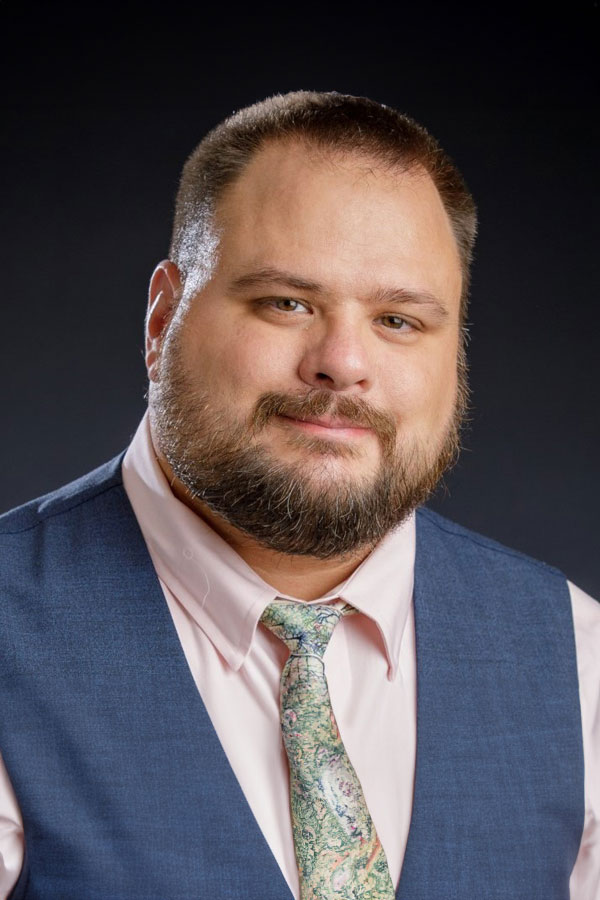
Jason DeFreitas, Ph.D., joined Falk College in the Department of Exercise Science as a professor and department chair in 2024. He earned his Ph.D. and master’s degree from the University of Oklahoma, where he later became a faculty member, spending 11 years teaching classes primarily focused on neuroanatomy and neuromuscular physiology.
His research focuses on how the brain controls movement and how aging and training change that control system. While at Oklahoma State, he won several university-wide awards for his research.
DeFreitas was among the second cohort of the Hevolution/AFAR New Investigator Awards in Aging Biology and Geroscience Research, a grant program that enables early career investigators with labs in the United States and Canada to advance research projects in basic biology of aging and geroscience projects that pave the way for healthspan-expanding therapeutics and treatments.
“Dr. DeFreitas has established himself as a highly productive scholar in neuromuscular physiology and exercise neuroscience,” says Falk College Dean Jeremy Jordan. “His publication record demonstrates both quantity and quality, with 91 peer-reviewed articles that have garnered over 2,500 citations. Of his total publications, he has maintained first or senior author position on 54 percent of papers, demonstrating his leadership role in research collaborations.”
Ignatius Ijere, Public Health
Promoted to Teaching Professor
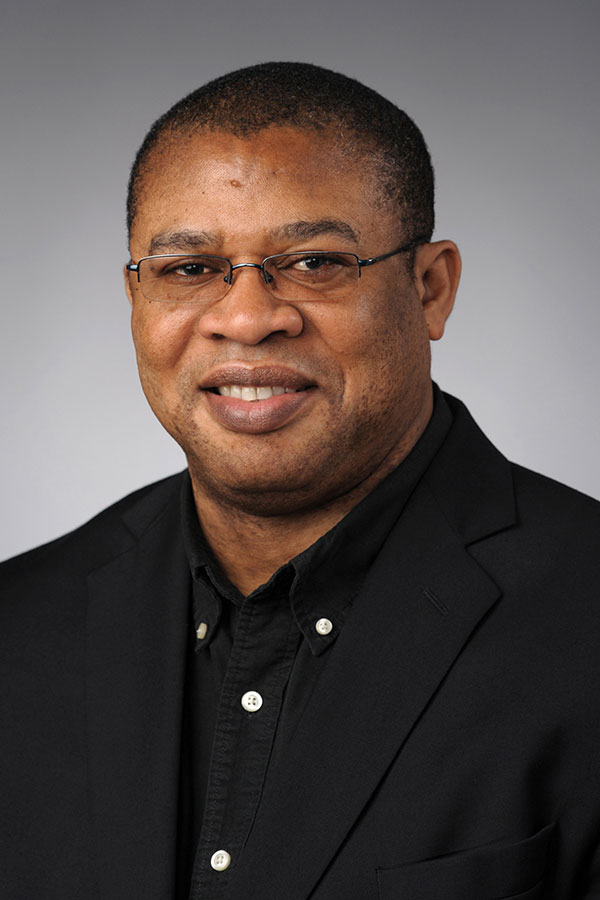
His expertise is in the areas of mental illness and addiction with professional experience as a mental health and addiction counselor with the Gateway Foundation and Thresholds Psychiatric Rehabilitation Centers. He previously served as an adjunct faculty member in the Department of Public Health at the College of DuPage, Waubonsee Community College, and St. Augustine Community College.
“Peer and student evaluations of Dr. Ijere’s teaching performance are consistently positive and describe a deeply respectful professor who cares about student well-being,” Department of Public Health Chair David Larsen says. “They also a describe an approach to teaching which is skillful, particularly when it comes to organizing complex and/or difficult material in ways that students can understand. Dr Ijere has taught an incredibly diverse menu of courses, and I laud his willingness to step in and teach courses on overload that are critical to department success.”
Jeremy Losak, Sport Analytics
Promoted to Associate Professor with Tenure
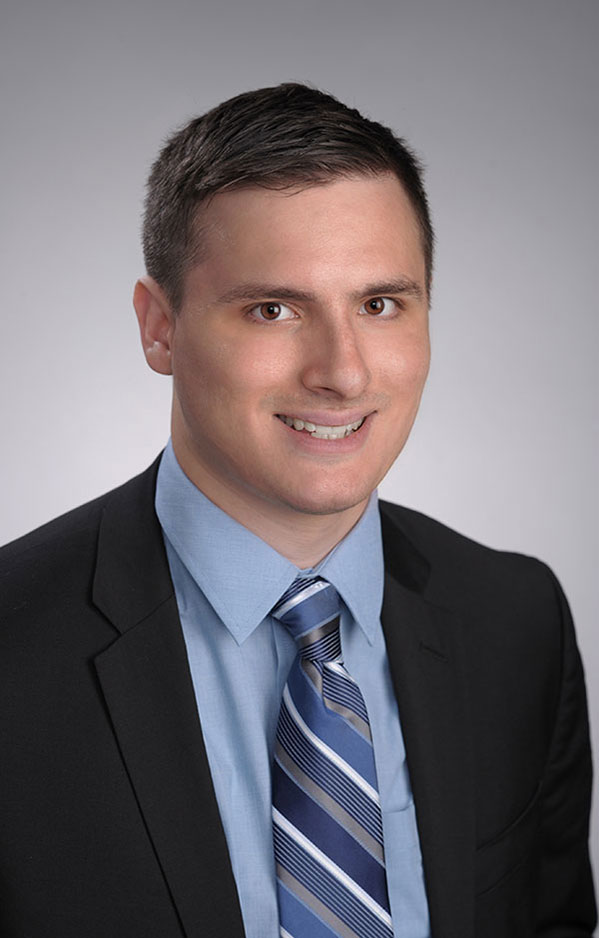
He is one of the faculty members who organizes and runs the Berlin Sports Analytics Academy, a program that brings high school students from across the country to Syracuse University over the summer to provide them with an immersive, hands-on college preview.
“Jeremy is an outstanding teacher and mentor, known for his dedication to student success both inside and outside the classroom,” says Sport Management Professor Rodney Paul, Ph.D., director of the Sport Analytics program. “His engaging teaching style and accessibility have made a lasting impact on the Sport Analytics program.
“Jeremy’s research spans sport economics, sports betting, and fantasy sports, with work published in leading journals such as the Journal of Sport Economics and the International Journal of Sport Finance,” Paul adds. “This is a well-earned recognition of his contributions across teaching, mentoring, and scholarship. Congratulations, Jeremy!”
Miriam Mutambudzi, Public Health
Promoted to Associate Professor with Tenure
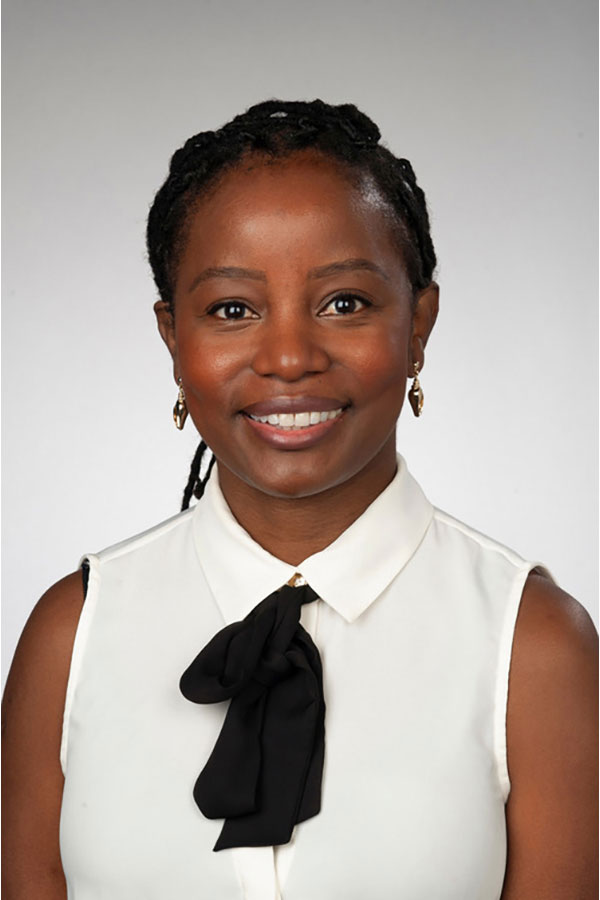
Prior to joining Syracuse University, Mutambudzi served as a research associate in the MRC/CSO Social and Public Health Sciences Unit at the University of Glasgow in Scotland, and a guest epidemiology professor in the Department of Epidemiology and Social Medicine at the University of Antwerp in Belgium. She has published extensively in peer-reviewed journals, including the European Journal of Ageing, Journal of Gerontology: Medical Science, and the Journal of Occupational and Environmental Medicine.
“Dr. Mutambudzi has established herself as a leading scholar in life-course epidemiology, with expertise in examining how socially patterned exposures and cumulative biological burden influence disease risk and health outcomes in older adults,” says Falk College Dean Jeremy Jordan. “Her research portfolio demonstrates both impressive productivity and significant impact on the field.”
Lisa Olson-Gugerty, Public Health
Promoted to Teaching Professor
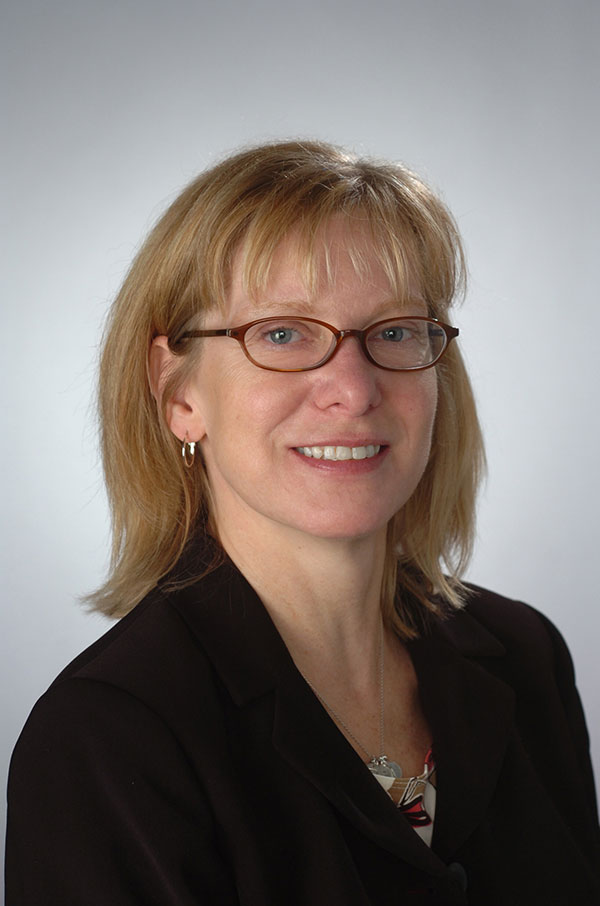
Olson-Gugerty is a nurse practitioner who maintains an outside practice as an emergency healthcare provider at a regional community healthcare center. She earned her Doctor of Health Science (D.HSc.) from Nova Southeastern University, and she also holds a Master of Public Health from the University of South Florida, a master’s degree in Nursing, Family Primary Care, from SUNY Upstate Medical University, and a bachelor’s degree in health science from SUNY Cortland.
Olson-Gugerty has served as a faculty thought leader by granting interviews to several top media outlets, including most recently ABC News, Yahoo Life, and Parade.
“Professor Olson-Gugerty has a background as both a practicing clinician and an academic,” says Department of Public Health Chair David Larsen. “This has informed her teaching philosophy, which emphasizes real word applications and the development of student critical thinking skills. She is dedicated to the student experience and works to create an inclusive and welcoming classroom environment.”
Stefanie Pilkay, Social Work
Promoted to Associate Professor with Tenure
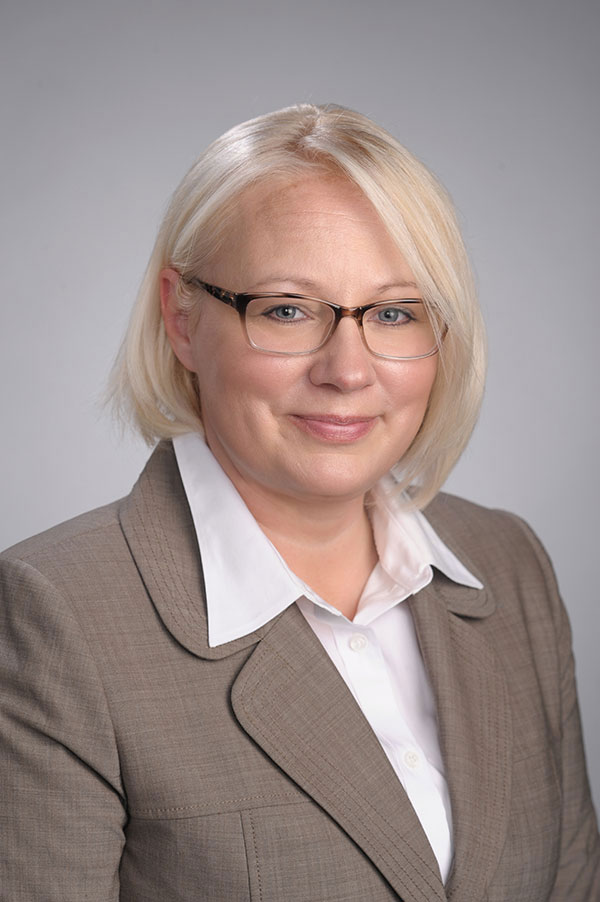
Pilkay’s scholarship addresses longstanding needs to better understand the relationships between adversity, epigenetic changes, and developmental outcomes including health and behavior to improve treatment and prevention outcomes for children and adolescents with health and behavioral issues exposed to poverty, stress, and environmental toxicants. Dr. Pilkay’s pioneering studies have been published in peer-reviewed journals, and her work has been supported by external grants. She has investigated particularly important questions of relevance to social work and genetics, especially in her pioneering work on trauma and its impact on gene expression.
“Dr. Pilkay is an exceptional addition to our faculty, and we are thrilled to welcome our newest colleague to our ranks!” says School of Social Work Chair Carrie Jefferson Smith.
Xiafei Wang, Social Work
Promoted to Associate Professor with Tenure
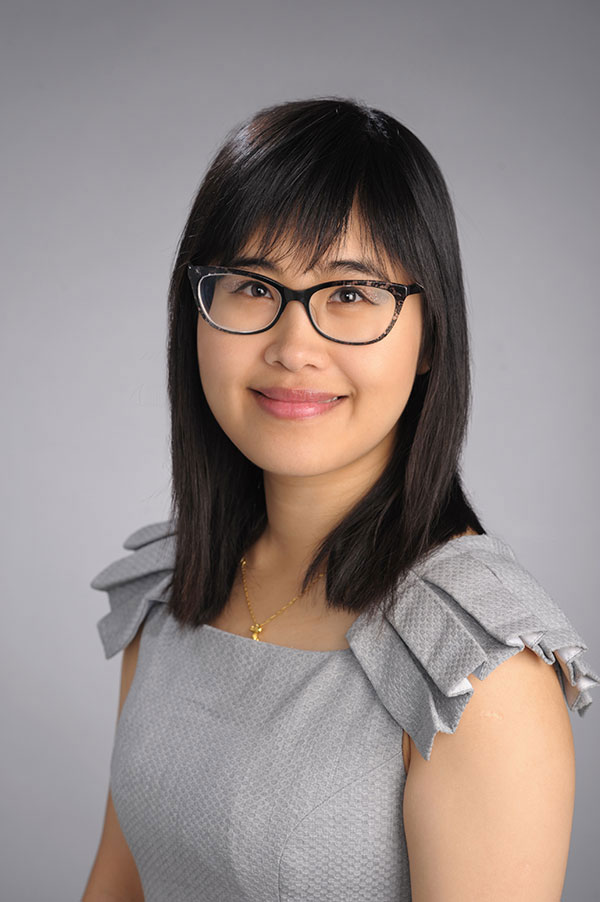
Wang’s scholarship addresses childhood trauma, intergenerational transmission of trauma, resilience, and the roles of race, gender, rural culture, and military experiences. Her work provides direct implications for designing programs and policies for diverse people experiencing trauma.
Awarded the Falk College Faculty of the Year Award for Excellence in Research in 2021, Wang has published extensively in high-impact journals and in chapters of peer-reviewed books. She has established a robust record of external funding from notable sources, including the Health Resources Services Administration and National Institute of Health.
“Dr. Wang has contributed substantially to the teaching and service environments of our program,” School of Social Work Chair Carrie Jefferson Smith says. “We are delighted to welcome Dr. Wang as a fully tenured colleague, and we anticipate a bright future as she continues to influence future directions in our understanding of trauma.”
As part of Syracuse University’s go-forward plan announced this past fall for the Falk College human dynamics programs, the Department of Public Health will join the Maxwell School of Citizenship and Public Affairs and the School of Social Work will be housed in the School of Education starting July 1, 2025.
Class of 2025 Nutrition and Food Studies Awards
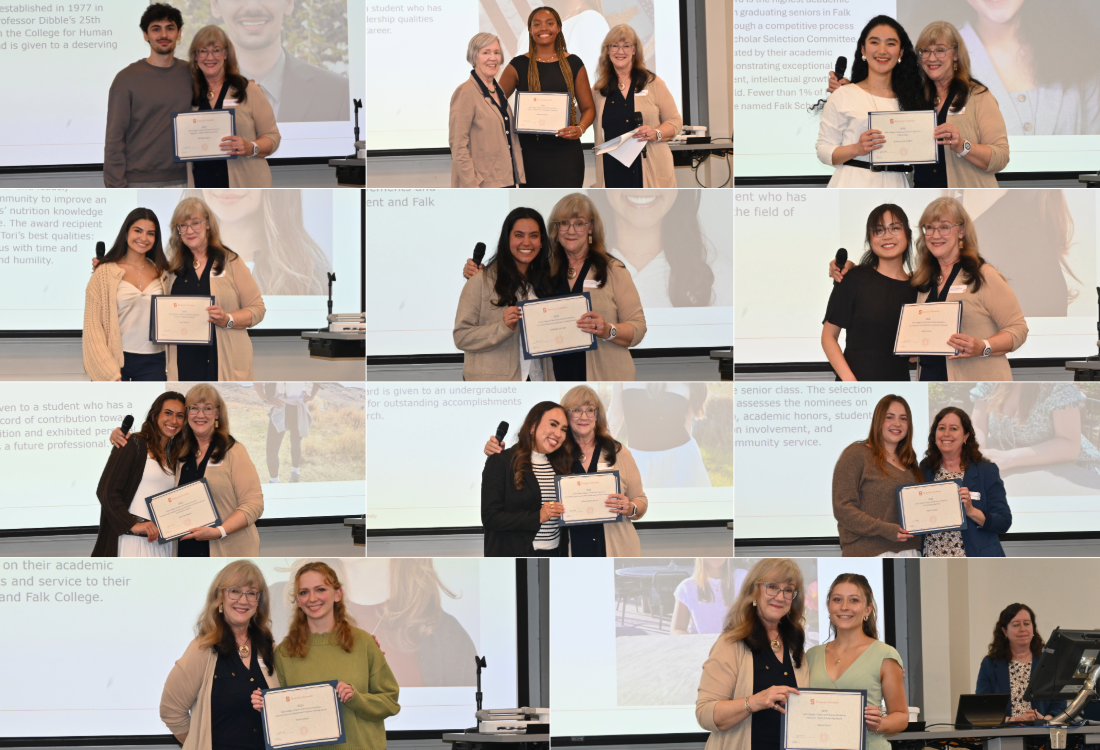
The Department of Nutrition and Food Studies in the Falk College of Sport and Human Dynamics recently honored several undergraduate and graduate students with 2025 department awards at its annual awards ceremony.
The Department of Nutrition and Food Studies recognized the outstanding contributions of the following students:
Food Studies
Food Studies Research Award (Graduate)
Recipient: Amy Bentley
About Amy: Amy worked with Professor Rick Welsh and an interdisciplinary group of scientists across multiple institutions to support the Coast-to-Cow-to-Consumer project, funded by the National Institute of Food and Agriculture, which investigates the ecological, social, political, economic, and bovine herd health effects of feeding algae-feed supplements (AFS) to dairy cows. She took the lead implementing a survey of dairy nutritionists on their attitudes, knowledge, and opinions of feeding AFS and handled data management and analysis.
In addition, Amy’s thesis on “Power in International Climate Governance: Agriculture and Sovereignty in Vanuatu” was an ambitious project to discern the link between food sovereignty policy and practice in the island state of Vanuatu and its recognized leadership in global climate governance through international institutions and agreements. Amy developed the topic and methodology, and recruited interview subjects with various backgrounds and expertise to investigate this critical environmental issue.
Food Studies Graduate Marshal
Recipient: Mai Ngoc Nguyen-Jeanneret
About Mai: While completing her master’s degree in Food Studies, Mai was an integral member of the program and campus community. She completed her practicum work with The Institute for Sustainability Management at Syracuse University, where she focused on the impacts of food waste and food waste prevention strategies, advocating for a closed-loop agricultural system. Her work included reaching out to food system professionals across New York State to learn about, advocate for, and advance comprehensive composting systems. Her contributions were essential for furthering the Institute’s short- and long-term plan for composting initiatives. Mai is looking forward to a career in food system sustainability with a focus on closed-loop agriculture, food waste reduction, and composting.
Community Engagement Award (Graduate)
Recipient: Lawrence “Ren” Christopher Lam
About Ren: Ren is very passionate about improving food access for all students in institutions of higher learning. He is committed to improving SNAP awareness, increasing student enrollment in the program, and strengthening the way institutions of higher learning connect students with essential resources. For his practicum, he explored ways of enhancing SNAP outreach and awareness among Syracuse University students and staff. He also explored the feasibility of implementing SNAP at an on-campus vendor as a way to expand food access beyond the food pantries. He held meetings with numerous staff members in Student Services as an effort to create more awareness on the issue and produced a benchmarking report that would inform on-campus initiatives for addressing food insecurity. Ren plans to pursue a career in the area of student basic needs advocacy.
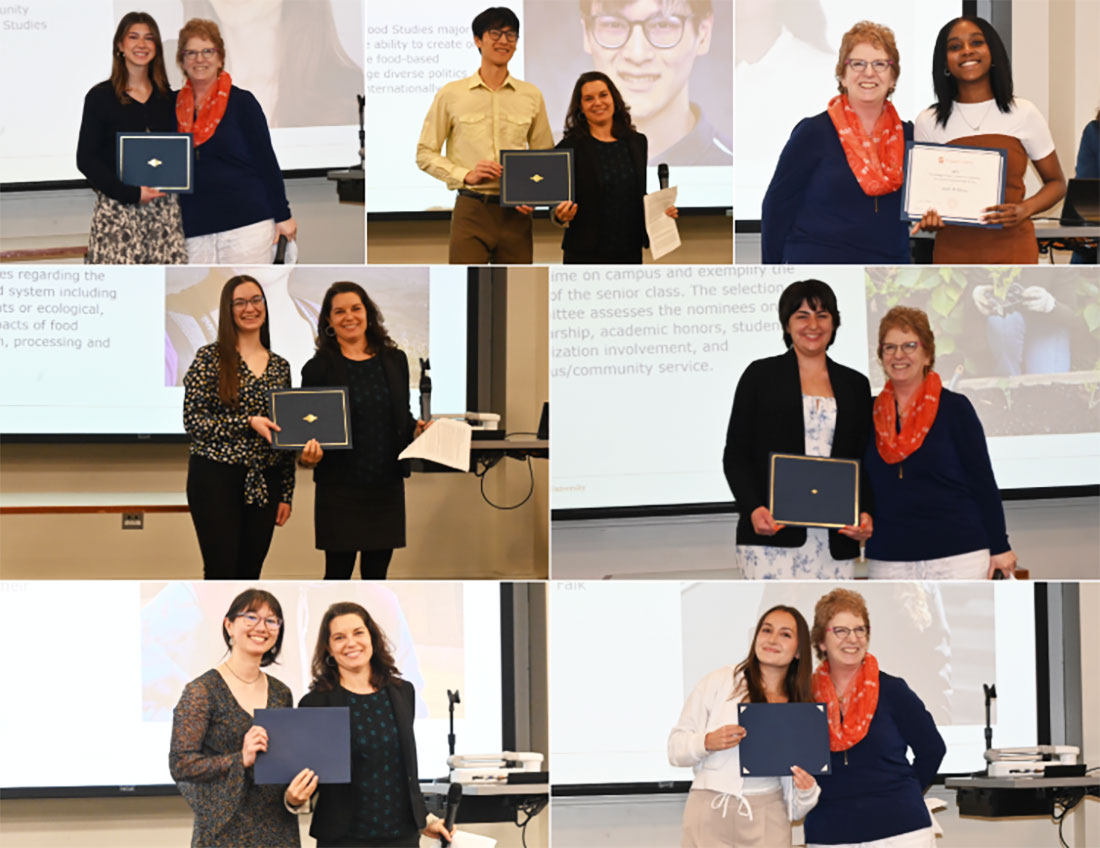
Food Justice Award (Undergraduate)
Recipient: Ruth Williams
Ruth: This award recognizes a student who shows a strong commitment to food justice and sustainability. Ruth worked at the food pantry on Syracuse University’s South Campus, where she demonstrated exceptional leadership, organizational skills, and a strong commitment to sustainability and food justice. Her work involved research in food production and emergency food systems, program development, cooking demonstration, and community engagement across disciplines for smooth pantry operations.
Chef’s Prize (Undergraduate)
Recipient: Audrey Small
About Audrey: This recognition goes to a Food Studies major or minor who demonstrates exceptional ability in the culinary arts. This ability includes food justice and community engagement goals of the Food Studies Program. Audrey took every culinary class available to her while studying at Syracuse University. In these courses, she continually demonstrated continuous learning, whether from expanding techniques, learning new equipment, or connecting culture and global food issues in our food systems to better outcomes for all. In addition, Audrey worked as the Food Pantry Manager for Syracuse University’s Sustainability Management Office, where she managed daily pantry operations and ensured efficient service for students facing food insecurity. Her duties included supervising community partnerships and securing monthly donations through an “Adopt-A-Month” program.
Food Studies Culture and Commensality Award / Falk College Marshal (Undergraduate)
Recipient: Laura Jayne
About Laura: This award is given to a Food Studies major who has expanded the Food Studies program to new audiences by sharing food knowledge and practice through social activism. Laura was involved in the greater Syracuse community throughout her time at Syracuse University. She was a community engagement assistant at the Brady Market, on the Health and Justice Evaluation team at Syracuse-Onondaga Food Systems Alliance, and a member of Cooking on the Hillside through the Shaw Center Nutrition Initiative.
In addition, Laura was on the Dean’s list in both Falk College and the Newhouse School, and she received the Chancellor’s Scholarship, Invest in Success Scholarship, and third place in the Maxwell School of Citizenship and Public Affairs Policy Memo Competition. She was a member of three clubs on campus: Food Recovery Network, Club Sailing, and First Year Players. Somehow, she also found time to volunteer in admissions, participate as a learning assistant in culinary courses, and volunteer in Pete’s Giving Garden.
Food Studies Undergraduate Marshal
Recipient: Ashley Goldberg
About Ashley: The program marshal is selected for their distinguished achievement in scholarship, academic honors, student organization involvement, leadership, and collegiality, as well as campus and community engagement and service. Ashley Goldberg is a voracious learner. She brought outstanding curiosity to the classroom and an ability to engage with those around her. She was a member of Delta Alpha Pi International Honors Society, a lead admissions ambassador, and an academic and peer ambassador for Falk College. She was also a writer for University Girl Magazine, Vice President of Alpha Epsilon Phi, and sat on the national board of Eye to Eye working with children with learning disabilities through self-reflection and writing.
Nutrition Science and Dietetics
Nutrition Science and Dietetics Research Award (Graduate)
Recipient: Julia Galindo Sebe
About Julia: Julia successfully completed her thesis entitled “Relative Energy Deficiency Risk in Physically Active Females and Inflammation: Is there a correlation?” under the supervision of Dr. Jessica Garay. Dr. Garay notes that Julia was an instrumental part of her research team through her work in collecting and analyzing data on female athletes. Julia demonstrated exceptional problem-solving and critical thinking. Furthermore, she always had a positive demeanor and interacted respectfully with faculty, fellow students, and research participants. Julia truly embodies what it means to be a scholar.
Outstanding Graduate Assistant in Nutrition Science Award
Recipient: Cassidy Mosher
About Cassidy: Cassidy demonstrated outstanding performance as a graduate teaching assistant for one of the sections of NSD 225: Nutrition in Health under Dr. Ramalingam. Cassidy brought a spark to every class, was always one step ahead, and was full of creative energy. Her efforts made the class more enjoyable for the students, and her extra credit activities were popular with the students.
Outstanding Graduate Student in Nutrition Science and Dietetics Award
Recipient: Craig Osbeck
About Craig: Craig embodies many of the qualities of an exceptional graduate student: excellent work ethic, full immersion in his studies, and genuine curiosity and leadership balanced with humility and humor. As a second-career student, Craig was a leader and shared his wisdom with his classmates through acts of kindness and appreciation. Craig excelled academically, earning a 4.0 GPA, and received accolades from his supervised experiential learning site supervisors. Craig will be a welcome colleague as he begins his career as a dietitian in Central New York.
Outstanding Professional Practice Award (Graduate)/
Recipient: Samantha Trouvé
Recipient: Samantha Trouvé
About Samantha: Sam has an unmatched passion for the field of nutrition and dietetics with a drive that led her to succeed throughout the program. She was always two steps ahead and ready with thoughtful responses. Sam thoughtfully contributed to the program improvement recommendations that led to curriculum changes to enhance the student experience. Sam excelled academically, earning a 4.0 GPA, and Sam applied her knowledge in practice in a way that will allow her to thrive as a future practitioner.
Nutrition Department Graduate Marshal
Recipient: Kirsten I. Gunderson
About Kirsten: Kirsten exemplifies the qualities of a leader and was chosen as the Graduate Marshal based on her well-roundedness as a student, including her academic excellence, and her involvement in Falk College. Kirsten was a consistent advocate for the department, promoting nutrition programs to many prospective students in her role with the Falk Colleges Office of Admissions. Kirsten was president of the Nutrition Graduate Student Organization, and she represented the Nutrition Science programs at the Graduate Student Organization meetings.
Emily Gere Coon Award (Undergraduate)
Recipient: Margaret McAree
About Margaret: This award was established in 1952 by Harold Coon in memory of his wife, a faculty member in the College for Human Development who was also a member of the first graduating class in 1922. The award is presented to the sophomore with the highest academic average in Nutrition in their freshman year, and Maggie earned the award among last year’s exceptionally competitive first-year class. Originally from Arlington, Virginia, Maggie is passionate about becoming a Sports Registered Dietitian. She has already started gaining experience in the field by volunteering with the Syracuse University football program, supporting the Registered Dietitians who work with Syracuse University Athletics.
Faculty Award for Excellence in Nutrition Science (Undergraduate)
Recipient: Molly Scott
About Molly: This award is presented to an undergraduate student in Nutrition Science who has demonstrated excellence in their field of study. Molly is an outstanding student who completed B.S. degrees in both Nutrition Science and Biochemistry. Her passion for research and medicine led her to work as a research assistant in Syracuse University’s Steinhardt Biochemical Synthesis Lab, where she studied the molecular underpinnings of neurodegenerative diseases. Molly also worked on the effects of prenatal alcohol exposure in Dr. Karen Boschen’s Lab at SUNY Upstate. Molly has been accepted to SUNY Upstate for Medical School beginning in the fall. Her dedication to understanding how biochemistry and nutrition shape human health truly exemplifies the spirit of this award.
Vershann Icem-Wright Professional Promise in Nutrition Science and Dietetics Award (Undergraduate)
Recipient: Ella Gharabegian
About Ella: This award is presented to a nutrition student who has a well-rounded record of contribution toward the field of nutrition and his/her personal development as a future professional. Ella was honored for her outstanding dedication to the field of nutrition. She completed internships in weight management and sports nutrition at both Syracuse University and Boston College. Ella also contributed to the work of the New York State Dietetic Association. She will continue her education at Simmons University in Boston through a coordinated master’s and dietetic internship program, with the goal of becoming a Registered Dietitian.
Marjorie V. Dibble Scholarship Award (Undergraduate)
Recipient: Michael Capous
About Michael: This award was established in 1977 in recognition of Professor Dibble’s 25th anniversary with the College for Human Development and is presented to a deserving student in the Nutrition Science and Dietetics program. Michael is an exceptional junior in the Nutrition Science and Dietetics program with a strong academic record and deep commitment to scientific research. Under the mentorship of Dr. Latha Ramalingam, he has investigated the epigenetics of paternal obesity and the potential protective role of fish oil supplementation using advanced genomic techniques. His work contributes to the growing understanding of dietary strategies to prevent inherited metabolic disorders and will be featured in national conferences and a forthcoming peer-reviewed publication. Michael plans to apply to medical school in the upcoming year.
Nutrition Science and Dietetics Research Award (Undergraduate)
Recipient: Sofia Arashiro-Garcia
About Sofia: Sofia was a member of Dr. Ramalingam’s research lab for the past two years. As a McNair Scholar, she led a compelling research project exploring the role of fish oil in preventing paternal obesity and improving offspring health outcomes. Her work dives into the biological mechanisms behind these effects, with a particular focus on liver health in the offspring. Sophia’s commitment to scientific inquiry and excellence was evident not only in her presentation at the McNair Symposium, but also in her upcoming role as a co-author on a peer-reviewed publication stemming from her research. She will soon join Columbia University to continue her academic journey and pursue cutting-edge research in human nutrition.
Peer Leader in Nutrition Science and Dietetics Award (Undergraduate)
Recipient: Sofia Vatnik
About Sofia: In nominating Sofia for this award, her peers highlighted her work creating and implementing a preschool nutrition program in her community and her work on the Syracuse University campus to improve the dining experience for students with dietary restrictions, including founding Syracuse’s first Gluten-Free Ambassador Program. Sofia also serves as a Falk Peer Ambassador and Peer Advisor and was recently selected as Freshfest Co-Chair at Syracuse Hillel. With a strong commitment to helping others, Sofia has demonstrated that she is a role model and leader among her peers.
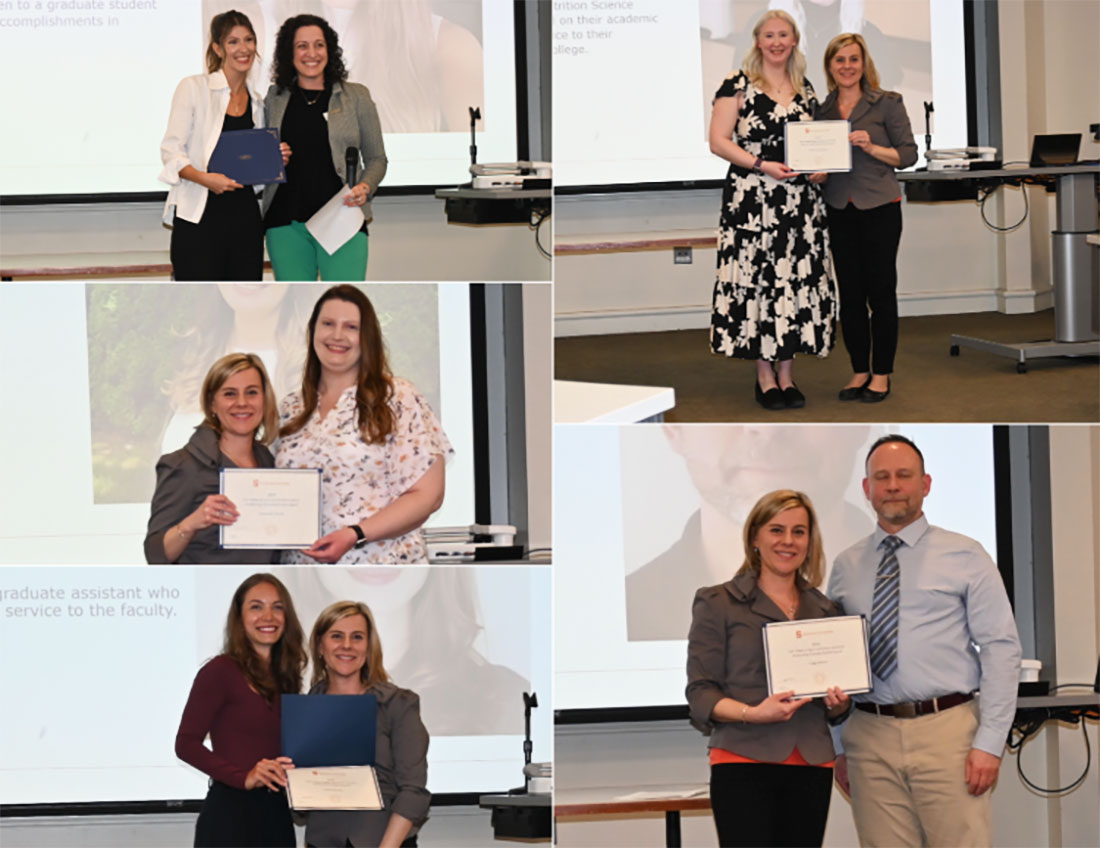
Ruth Tolley Award–Women of the University Community (Undergraduate)
Recipient: Tracey Rodriguez
About Tracey: Tracey was a Nutrition Science major and Renee Crown Honors student recognized for her academic performance, critical thinking, and attention to detail. She earned one of the highest grades in her Lifespan Nutrition course, reflecting her ability to grasp complex material. Beyond her academic excellence, Tracey pursued a minor in Music Performance and was an active member of Syracuse University’s First Year Players, demonstrating a passion for the arts alongside her commitment to science. She plans to continue her academic journey with graduate studies in Biochemistry, with the ultimate goal of earning a Ph.D.
Susan J. Crockett Prize for Student Leadership (Undergraduate)
Recipient: Monday Carter
About Monday: Monday was an outstanding nutrition student whose academic and service achievements reflected her deep commitment to community health and cultural preservation. As a Renee Crown Honors student, she completed a Capstone thesis on dietary changes in Indigenous communities, exploring the impact of colonization on traditional foodways and chronic disease risk. Her research connected her with members of the Haudenosaunee community and ongoing health restoration efforts. Monday’s leadership emerged early, when she assumed responsibility for the Cooking on the Hillside program as a first-year student—an unprecedented level of initiative. Now a paid program coordinator at the Shaw Center, she oversees three nutrition-focused community service programs that serve local youth. Her contributions earned her multiple awards, and she continued to engage in campus leadership roles, including the Black Student Union and the WellsLink Leadership Program, while also pursuing policy interests through experiences in Washington, D.C.
Victoria F. Thiele Scholarship Award (Undergraduate)
Recipient: Alexia Harris
About Alexia: This award was established in 1981 in memory of Dr. Victoria F. Thiele in recognition of her contributions and is presented to a deserving student in the Coordinated Dietetics program. Alexia transferred to Syracuse University in fall 2023 as an exercise science major and changed her major to Nutrition. Alexia found her home in nutrition and became an exceptional student and active volunteer. Alexia was recently elected to be the president of the Nutrition Education and Promotion Association for the 2025-26 academic year. Alexia plans to continue to graduate school to fulfill her requirements to become a registered dietitian.
Victoria Li Scholarship Award (Undergraduate)
Recipient: Sara Valencia
About Sara: This award is presented to a student who exemplifies some of Victoria Li’s best qualities: compassion, positivity, and humility. Sara is a dedicated and multi-talented nutrition student whose passion for dietetics is evident in her strong academic performance, service contributions, and leadership across campus and the Syracuse community. From her first year at Syracuse University, Sara actively engaged in numerous outreach initiatives, including Cooking on the Hillside and Books and Cooks, where she led hands-on nutrition and culinary education sessions for youth in the Syracuse City School District.
She played a key role in the success of the St. Joseph’s Hospital Food Farmacy project, creating bilingual social media and video content to support nutrition education for food-insecure patients. Her interest in sports nutrition led her to intern as a sports dietitian for the Syracuse University football team as she supported Division I athletes in their performance nutrition needs. Sara will continue her academic journey as a member of our next class of nutrition science master’s students in the fall.
Nutrition Science Undergraduate Marshal
Recipient: Rosie Jaques
About Rosie: Rosie demonstrated exceptional academic achievement and a clear passion for the field of nutrition. A Renée Crown Honors student with an outstanding GPA, she was known for her initiative, leadership, and dedication, especially in her work with the department’s culinary courses. Since taking Food Science as a freshman in 2022, Rosie served as a Learning Assistant in over 20 classes with Chef Bill Collins, who describes her as “the best Learning Assistant I’ve had in 18 years!” Respected by both faculty and peers, Rosie is a conscientious scholar and a warm and reliable team member, loved by the students and all the instructors she has assisted.
Nutrition Undergraduate Marshal
Recipient: Ashleigh Lok-Jack
About Ashleigh: Ashleigh was selected as the Undergraduate Nutrition Department Marshal in recognition of her outstanding academic performance and dedicated service to the department and Falk College. Her contributions include active involvement in the Nutrition Education Promotion Association (NEPA) and the Shaw Center Nutrition Initiative, where she volunteered her time to support nutrition education for both elementary and high school students.
Selleck Award / Falk College Marshal (Undergraduate)
Recipient: Rylee Pepper
About Rylee: The Selleck Award is presented to a senior student in Child and Family Studies and a senior student in Nutrition Science and Dietetics with the highest cumulative GPA. For the past two years, Rylee has been a valuable part of the Mindfully Growing Research Lab team where she assisted with various tasks, including child nutrition lessons and assessments. She is passionate about helping individuals effectively manage their food allergies and intolerances. Her Honor’s Thesis focused on this topic and is entitled “Food for Thought: Improving the Quality of Life Among College Students with Dietary Restrictions.”
Rylee was selected as a Falk College Marshal in recognition of her exceptional academic achievements and meaningful contributions to the Falk College community. A top scholar in the Nutrition Science program and a past recipient of the Tolley Award, Rylee’s academic excellence was recognized multiple times throughout her undergraduate career. Her dedication to scholarship and research embodies the core values of Falk College and reflects the highest standards of intellectual and community engagement.
Additional Awards
The following Nutrition students were recognized at Falk College Dean Jeremy Jordan’s award ceremony earlier in the spring:
Falk College Scholar
Recipient: Xuezhu “Stephanie” Hua.
About Stephanie: Read more about Stephanie in this story about the Falk College Scholars.
Ann Selkowitz Litt Memorial Scholar (Academy of Nutrition and Dietetics Award)
Recipient: Caitlin Berenson
About Caitlin: Caitlin is a focused and high-achieving nutrition student with aspirations to become a clinical dietitian specializing in neonatal intensive care. She actively seeks opportunities to expand her knowledge through volunteer work at Crouse Health and the Hendricks Chapel food pantry, where she applies classroom learning to real-world settings. As a Virtual Assistant for Jenna Volpe, RDN, she helps translate complex nutrition concepts into accessible, evidence-based content for a broad online audience. Caitlin also founded a nutrition-focused Instagram platform where she shares recipes and student life tips, building a supportive community of aspiring dietitians. Her initiative, leadership, and passion for clinical nutrition have made her a role model for peers both at Syracuse and beyond.
Joan Christy Scholarship (Academy of Nutrition and Dietetics Award)
Recipient: Ella Gharabegian (bio above)
Falk Peer Advisor Award
Recipient: Rylee Pepper (bio above)
Falk Student Ambassador Service Award
Recipient: Sophia Arashiro-Garcia (bio above)
2025 Falk College Convocation
The celebration included two members of Syracuse University’s Board of Trustees, Ken Pontarelli and Deborah Leone, who had family members graduating from Falk, and a surprise visit from Otto the Orange, who helped Falk College Dean Jeremy Jordan take a selfie in front of all the graduating students!
Watch the slideshow above for photos from Convocation, and visit the Syracuse University Commencement website to watch the full Falk Convocation ceremony.
Guest speaker Benita Fitzgerald Mosley, an Olympic gold medalist and visionary executive, delivered an inspiring speech during which she encouraged graduates to ask “Why not me” when they dream about the goals they have set for their careers and personal lives. Here’s a video and story to learn more about Fitzgerald Mosley.
Dean Jordan reminded the graduates that they follow generations of Syracuse University alumni who refused to settle, pursued innovation, and conquered the challenges of their time. Now, it’s their turn.
“The worlds of sports, human performance, and applied and behavioral health are evolving rapidly,” Jordan said. “To become effective leaders, you must evolve with them—and I have every confidence you will.
“At Syracuse University and Falk College, we have strived to prepare you to meet these challenges head-on and become the change agents our world desperately needs,” he continued. “The education you’ve received here has equipped you with the tools to make meaningful contributions in your chosen fields. Your unique perspectives, innovative thinking, and commitment to excellence will undoubtedly lead to breakthroughs that improve lives and communities.”
Class of 2025 Falk College Scholars
Seven members of the Class of 2025 have been named Falk College Scholars–the highest academic award conferred by the Falk College of Sport and Human Dynamics on graduating seniors. Falk Scholars represent undergraduate students who display academic excellence, exceptional campus and community engagement, independent research and creative work, innovation in their disciplinary field, and personal integrity.
We asked the Class of 2025 Falk Scholars to describe their most impactful experiences at Syracuse University. Here’s what they wrote:
Grace Elizabeth Brashears (Human Development and Family Science)
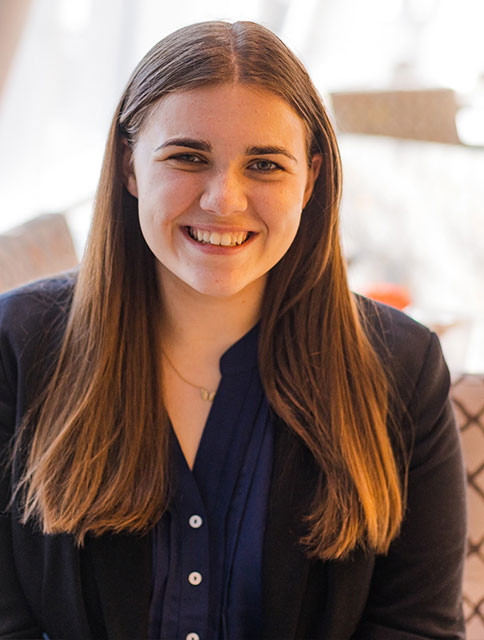
Throughout my time at Syracuse University and Falk College, I have been honored to take part in various service initiatives that help the very community I have called home for the last four years. The most influential of these was my work with Upstate Golisano Children’s Hospital as a Child Life Practicum student, and as president of OttoTHON at Syracuse University. In my time with OttoTHON, I have led a generation of students to raise over $400,000 for Upstate Golisano Children’s Hospital.Alongside my work with Golisano Children’s Hospital, I have been given the opportunity to impact my community through assisting in research that is developing more accessible research ethics training for individuals with intellectual and developmental disabilities. Additionally, I have worked with various organizations in Syracuse, including the Boys and Girls Club, RISE (Refugee and Immigrants Self-Empowerment program), beneath the surFACE at Upstate Cancer Center, Syracuse Red Cross, the Children’s Advocacy Center, Upstate Community Hospital, and more.
These opportunities, heavily supported by Syracuse University and Falk College, have successfully set me up for a lifetime of service and philanthropy, and a fulfillment of my purpose to use my education to benefit the lives of those around me. I will never forget my time at Syracuse and a part of me will always be here on the hill. Go Orange!
Xuezhu “Stephanie” Hua (Nutrition Science)
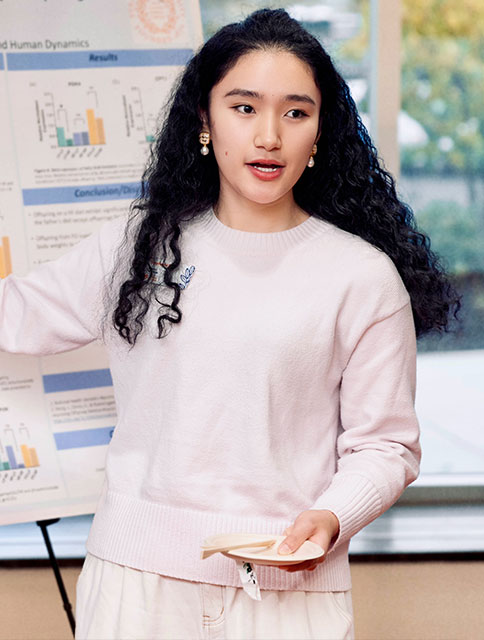
When I was a sophomore, I led a dorm room recipe project through the Office of Student Services in Falk College. The goal was to introduce healthy, easy-to-make snacks that people could take with them to class or work. I created three recipes—chocolate bark, microwave cake, and banana wraps—and prepared 100 samples. I presented these to students and faculty from Falk College, explaining the nutritional benefits and preparation methods. I found this experience incredibly rewarding and empowering as it allowed me to apply my knowledge to help others improve their health and well-being. It instilled in me a lasting commitment to use my expertise to make a meaningful impact in the community.
Another inspiring experience was my honors thesis done in Dr. Latha Ramalingam’s lab, where I investigated the effects of fish oil in reducing paternal obesity and improving muscle health in male offspring. This project was both inspiring and transformative—it was where I discovered my passion for biomedical science. Combined with foundational coursework such as Dr. Margaret Voss’s biochemistry class, anatomy, and physiology, I developed a deep passion and appreciation for the complexity and intricacy of human metabolic physiology—and the many avenues through which we can address disease. These experiences shaped my path toward studying metabolic diseases and cellular metabolism, fields where my passion aligns with pressing global health challenges.
Benjamin Lanza Jennings (Sport Analytics)
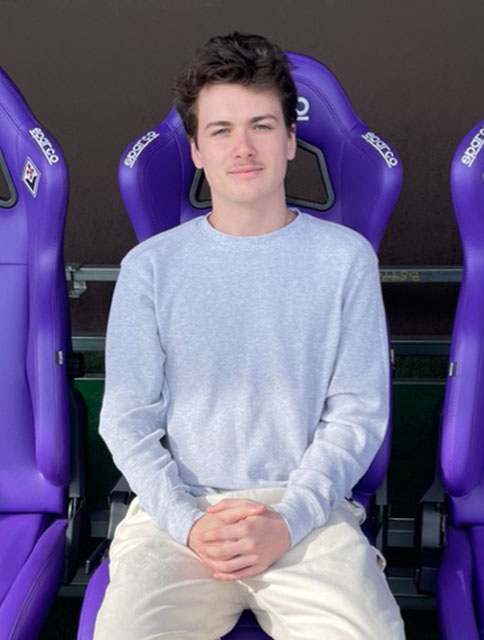
Being named a Falk Scholar is an incredible honor and a reflection of the meaningful experiences I have had at Syracuse University. I have always been passionate about working in sports, and Falk College gave me the tools, support, and guidance to pursue a career in sport analytics.One of the most memorable experiences was traveling to Italy as part of the first Sport Data in Italian Football course. I learned a ton about analytics in a global context, was immersed in the Italian culture, and had the opportunity to deliver a data-driven presentation to the Bologna FC professional soccer team.
Working with Syracuse’s football and women’s soccer teams gave valuable hands-on experience in sports I am truly passionate about. Winning the 2024 Syracuse University Basketball Analytics competition helped me grow both technically and creatively. All of these opportunities provided me with the skills and confidence to succeed with professional organizations.
I am incredibly grateful to the professors, advisors, and staff at Falk College who encouraged me, opened doors, and helped me prepare for what’s next. Syracuse University and the Sport Analytics program made it possible to turn my passion into a path forward in the sports industry.
Jarrett Markman (Sport Analytics)
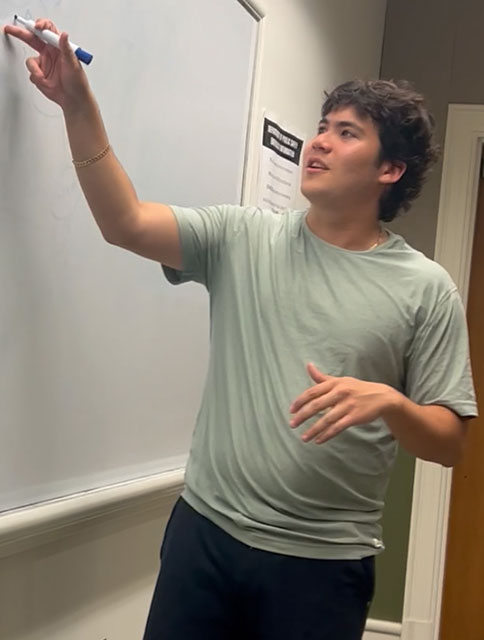
The most impactful experience I’ve had at Syracuse University was the opportunity to develop a passion for learning. In the Sport Analytics program, I was able for the first time to blend my passion for academics (math-based work) with one of my favorite hobbies, sports. The program provides many learning opportunities, such as the many academic clubs presented to students in the major.Given my background playing tennis at a high-level, I was interested in creating my own club and combining my abilities as a tennis player and sport analyst. Due to the lack of popularity in tennis across the country compared to other sports, we built a close-knit group of members who discussed a variety of the technical and physical aspects of tennis that come from the perspective of playing, watching, and analyzing.
In our club, we utilized the knowledge gained from our coursework and applied that to various aspects of tennis. The Tennis Analytics Club has heightened my passion for learning, leveraging the power of data science (notably statistics), machine learning, and programming to identify the various ways to formulate powerful insights.
Anna Meara Pierce (Sport Analytics)
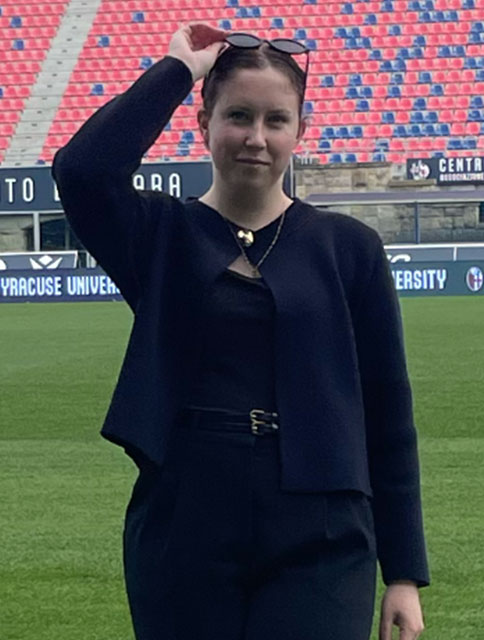
A lot of the impactful experiences I’ve had at Falk and Syracuse University have been on a smaller level, including the support of my professors and advisors. However, I’ve been lucky enough to go on several department-sponsored trips to conferences or other sport-related events.One such event was the 2024 NFL Draft in Detroit. The Sport Analytics and Sport Management teams used a previous connection with one of the community tourism-related groups organizing the draft to take six of us (three analytics students and three management students) to work the draft in areas from combine-related fan activations to manning the information desk. While I already knew that I wanted to work in fan engagement within the sport, the draft opened my eyes to the potential reach and success of a tent-pole event such as the draft, as well as to the world of fan engagement and events within football.
Ultimately, this trip showed me the possibilities for impact on the business side of the NFL and its teams, driving me to take a position with the Green Bay Packers in their business analytics department for post-graduation.
Nicole Yanza Shanguhyia (Public Health)
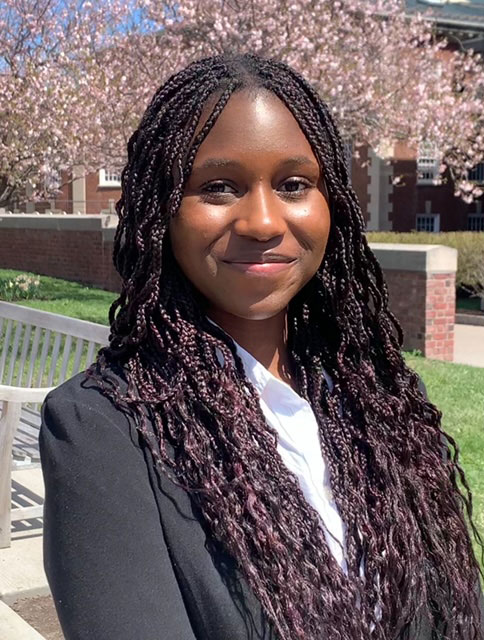
During my time at Syracuse University I’ve had the opportunity to meet a lot of wonderful people, but none quite like the members of the Student Association of Public Health Association. The designated student organization for the Department of Public Health, better known as SAPHE, was first introduced to me in my sophomore year.When Professor Lisa Olson-Gugerty announced she was reviving the student-run club, I wasu admittedly hesitant to join. At this point, I had yet to grow close to anyone in my major and was unsure of how welcoming other students would be. To my surprise, SAPHE evolved into the highlight of my time in public health. Through my involvement in the club, I deepened my understanding of health awareness by planning semester-long initiatives and on- and off-campus activities.
But more importantly, I formed lasting connections with so many incredible people in my major. Because of SAPHE, I could look around my classes and find comfort in familiar faces. As I’m preparing to move forward and reflect on my experiences at Syracuse University, I can say with confidence that the members of SAPHE represent the best that my department has to offer.
Jonah Aaron Soos (Sport Analytics)
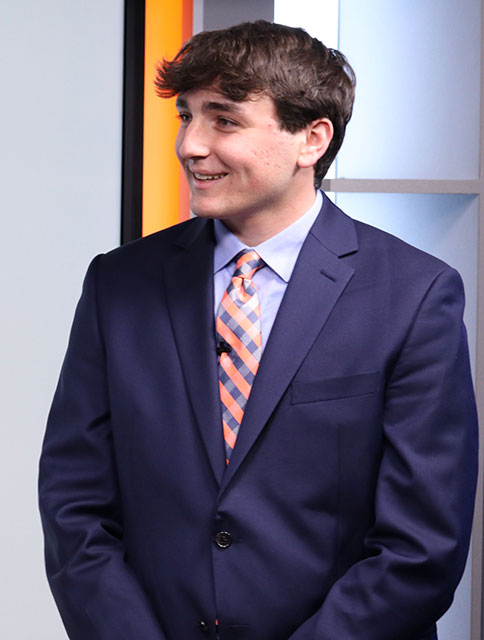
The moment that stands out during my journey at Falk College was the privilege of experiencing different parts of the sports industry across the country. Through research and case competitions, I have had the opportunity to visit multiple cities to network with students and professionals from around the country, experience new cultures, build bonds with fellow students, and have a chance to represent Syracuse and compete against top analysts nationwide.My most impactful trip was attending the Society for American Baseball Research (SABR) Analytics Conference in Phoenix, Arizona, each of the past two years with 20 other Syracuse students to compete in the Diamond Dollars competition and present some of my own research on Major League Baseball umpires and the challenge system.
Working closely with my peers has created a sense of community within Falk College, for which I’ll always be grateful, and has helped me make lifelong friends and many incredible memories. I’m excited to return to Phoenix as an alum and watch future generations of Falk students compete, and I’m also excited to see how they can one-up what we accomplished!
Faculty of the Year Awards

Mary Kiernan, Colleen Cameron, and Fei Pei were honored with 2025 Falk College of Sport and Human Dynamics Faculty of the Year awards for excellence in teaching, service, and research, respectively. The honorees were nominated by their peers for outstanding teaching, scholarship, and internal and professional service contributions and announced by the Falk College Faculty Council in late April.
Here’s a look at the 2025 honorees with comments from their award presenters:
Chef Mary Kiernan, M.B.A.
Undergraduate Director, Food Studies, and Teaching Professor, Nutrition and Food Studies
Evan Weissman Memorial Faculty of the Year Award for Teaching Excellence
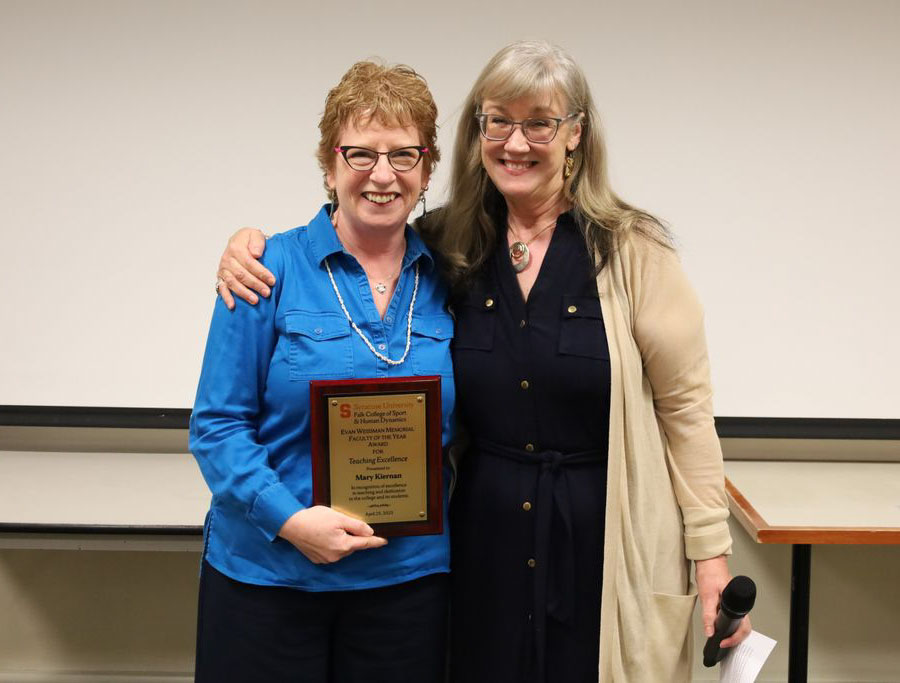
“It’s hard to imagine a more fitting honoree for an award that bears Evan’s name. In so many ways, Mary embodies Evan’s philosophy—his passion for student mentorship, commitment to teaching, dedication to social consciousness, and, of course, his dedication to food studies.
“Mary is a Teaching Professor in the Department of Nutrition and Food Studies, where she is known for transforming her classrooms into dynamic, immersive spaces. Her courses—spanning food safety, systems management, and urban food systems—equip students with essential technical skills while also challenging them to explore the social, cultural, and ethical dimensions of food.
“What truly distinguishes Mary in the teaching kitchen is her ability to bridge theory and practice. Whether she’s redesigning core curricula, mentoring independent projects, or advising students, she brings clarity, creativity, and compassion to everything she does.
“Her leadership as Undergraduate Director for the Food Studies program, her engagement with professional networks, and her commitment to inclusive, culturally rich programming and hands-on culinary experiences enrich our campus and our community. Mary’s work exemplifies excellence in education—and the spirit of this award.”
Learn more about Evan Weissman, Ph.D., Associate Professor in Food Studies and Nutrition who passed away in 2020.
Colleen Cameron, CCLS, M.Ed.
Undergraduate Director and Professor of Practice, Human Development and Family Science
Faculty of the Year Award for Excellence in Service
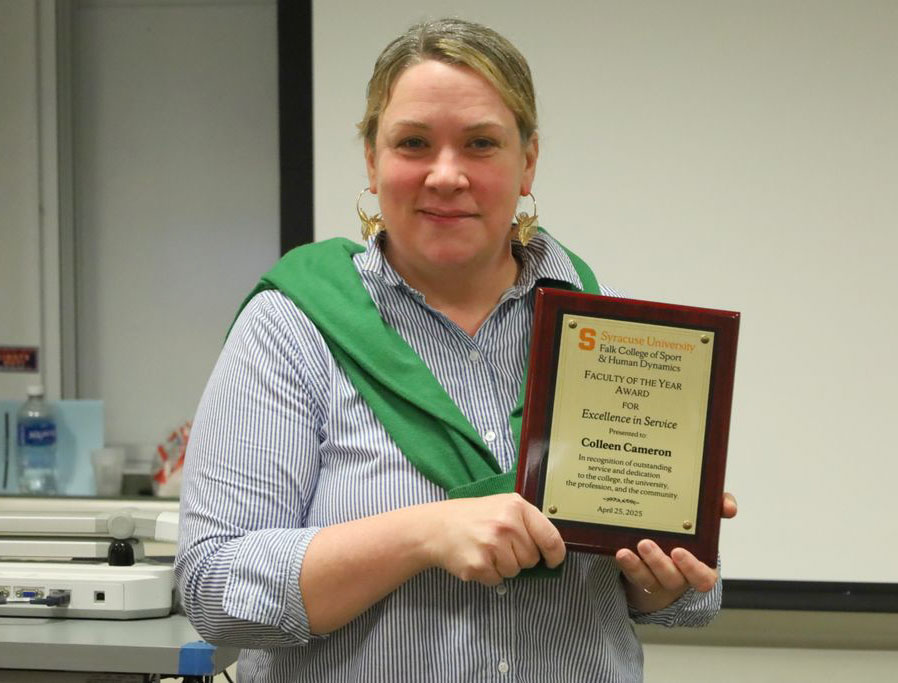
From presenter Tracey Reichert Schimpff, M.A., Ph.D., LMFT, Graduate Director and
Associate Teaching Professor, Department of Marriage and Family Therapy:
“Colleen is a Professor of Practice in the Department of Human Development and Family Science (HDFS), and a certified Child Life Specialist and End of Life Doula. She has been with Syracuse University since 2009, serving students, her Department, and the field.
“Her nomination letter states, ‘Colleen has always exemplified the very best of student-focused work and a commitment to our students and program. She is uniquely and wholly committed to the success of our students and has always gone above and beyond. Overall, Professor Cameron’s service work has been exceptional both in its breadth and in its impact.’
“In the nomination materials, it was noted that Colleen’s signature service is heading the Child Life program. It is an endorsed program that leads graduates to become certified Child Life Specialists. This requires knowledge of requirements, oversight of curriculum, and guiding students through the process that leads to certification. Colleen single-handedly ensures that this program continues.
“This past year, Colleen also served as Undergraduate Director in HDFS, managing curriculum, working with admissions and marketing, and engaging directly with students (and sometimes families). In a year of transition, I imagine this has been quite an undertaking!
“In HDFS, Colleen also serves as faculty advisor and chair of the Student Engagement Committee, which was created to increase student voice and connection. From what I understand, this committee has grown, and students have benefited greatly from Colleen’s dedication. Colleen served as mentor for Renee Crown honors students and led the HDFS New York City Career Immersion Trip, a trip that is highly regarded by HDFS students.
“In addition to the significant roles she plays in HDFS, Colleen also served at college and university levels. In 2024, Colleen was selected to serve on the Human Development Task Force. She was very committed to the process, and worked diligently to gather information and advocate for her department.
“Collen serves on the Syracuse University Senate and its Research and Creative Scholarship Committee. Collen is also engaged in service to her profession, acting as Director of the Conference Committee and Co-Chair of the Clinical Experience Task Force for the Child Life Academic Society. Finally, Colleen has even found time to volunteer at her school district and community council.
“It seems obvious that Colleen has made significant contributions to students, her department, and the larger University. She serves with commitment and leads with passion and professionalism. I am proud to call Colleen my colleague.”
Fei Pei, Ph.D.
Assistant Professor, School of Social Work
Faculty of the Year Award for Excellence in Research
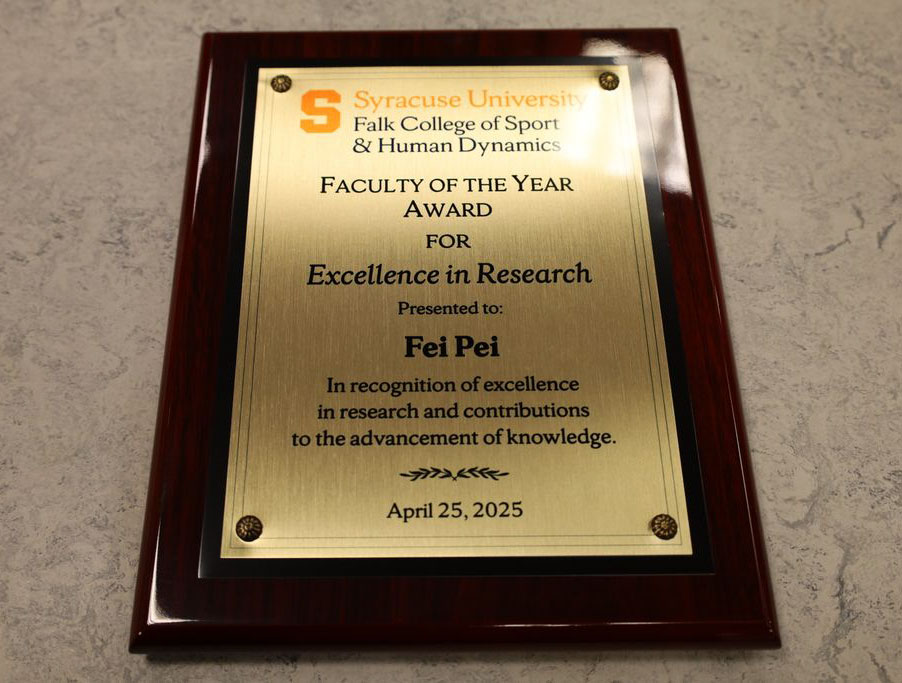
“Dr. Pei, who is in her fourth year in the School of Social Work, is a dedicated and productive researcher. Her advanced quantitative work demonstrates a clear research focus and trajectory and contributes to a crucial discourse in our field on the effects of neighborhood conditions, including violence, on children’s development.
“Fei has published 37 peer-reviewed articles in top-ranking interdisciplinary journals, including “Child Abuse and Neglect,” “Development and Psychopathology,” and “Children and Youth Services Review.” In 2024, she published four articles–three of which are first-authored–and submitted four additional manuscripts that are currently under review.
“In 2024, Fei also submitted four external grant applications, including three NIH (National Institutes of Health) applications for which she is principal investigator. Three of these applications are still under review and could use our collective good vibes!”
Gold Standard
Olympic gold medalist and visionary executive Benita Fitzgerald Mosley says it has been her lifelong mission to help people win gold medals in business–and in life.
“My gold medal is the gift that keeps on giving,” Fitzgerald Mosley says. “I am forever grateful, so I want to pay that gift forward.”
To get there, Fitzgerald Mosley highlights five “Olympic rings” to help people achieve their goals: Have a good start, set high goals, run your own race, power through hurdles, and have a strong finish.
“You have to ask yourself, why not me?’’ Fitzgerald Mosley says. “Why can’t I be the best in the world at what I do?”
From becoming the first African-American woman to win the 100-meter hurdles at the 1984 Olympics to her current role as chief executive officer of Multiplying Good, Fitzgerald Mosley has persistently broken barriers and advanced the idea that sport has the power to inspire and change the world.
Her enormous impact as a results-oriented leader in the Olympic, non-profit, and corporate worlds is why Falk College Dean Jeremy Jordan asked Fitzgerald Mosley to be the keynote speaker at the Falk Convocation at 12:30 p.m. May 10 in the Lally Athletic Complex.
“Benita’s ‘why not me?’ message encourages us to challenge societal expectations and embrace our potential, while Multiplying Good is helping people bring about positive change and inspiring them to do more,” Jordan says. “The life lessons and insights that Benita will share May 10 will provide valuable inspiration to our graduates and all of us.”
Using Fitzgerald Mosley’s five Olympic rings, here is her remarkable story:

Have A Good Start
Fitzgerald Mosley often uses a quote from former American politician and motivational speaker Les Brown, who said, “You don’t have to be great to get started, but you have to get started to be great.”
Fitzgerald Mosley’s parents, Fannie and Rodger Fitzgerald, were both educators and they encouraged Fitzgerald Mosley to get started in as many extracurricular activities as possible in their hometown of Dale City, Virginia. By participating in gymnastics, softball, majorettes, and track, and learning the piano, violin, flute and piccolo, Fitzgerald Mosley discovered what she loved and was good at and where to focus her attention.
“They were very supportive and stood by me in every aspect of my life,” Fitzgerald Mosley says of her parents. “They celebrated my every achievement, large and small, and I loved to make them proud.”
While she became the first chair flute for the Gar-Field High School symphonic band, Fitzgerald Mosley says she wasn’t very good at softball and grew too tall to be a gymnast. But middle school physical education teacher, family friend, and gymnastics coach Gwen Washington was also the coach of the track team and when it became obvious that Fitzgerald Mosley had outgrown gymnastics, Washington suggested she join the track team because she had seen Fitzgerald Mosley outrun the boys in gym classes.
“So I went out for the track team and started winning races from the very beginning,” Fitzgerald Mosley says. “It wasn’t until I was 12 years old and in the seventh grade that I even discovered my athletic prowess.”
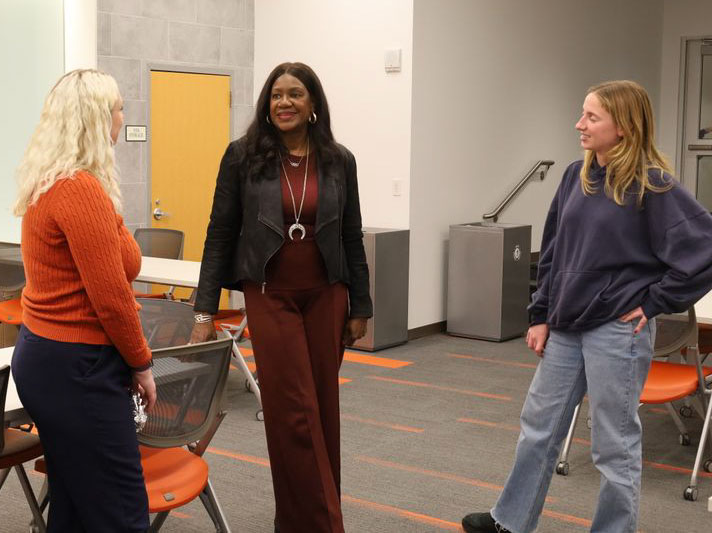
Set High Goals
As a high school freshman sprinter and hurdler, Fitzgerald Mosley helped the track team win its fourth consecutive Virginia state championship. She was a teammate of senior Paula Girven, who represented the United States in the high jump in the 1976 Olympics and qualified for the team in 1980. Their high school track coach, Anne Locket, also led the girl’s gymnastics and basketball teams to state championships.
“Coach Locket said to me, ‘You know, you can be an Olympian someday just like Paula,’ and I looked at her like she was from Mars,” Fitzgerald Mosley says, smiling. “But having a coach believe in you and say that to a youngster at 14 years old, it set me up for great things to come.”
By 1980, Fitzgerald Mosley was 18 and already a track star–and an industrial engineering major–at the University of Tennessee, where she would become a 14-time All-American and four-time NCAA hurdles champion. Like Girven, she made the 1980 Olympic team but didn’t participate because the United States led a boycott of the 1980 Summer Games in Moscow to protest the Soviet invasion of Afghanistan.
Fortunately for Fitzgerald Mosley, she was still in college and had the benefit of having access to coaching, training equipment, and the highest level of competition in college. This was a time when Olympic athletes were strictly amateurs who couldn’t make money off their athletic achievements, and many athletes who qualified for the 1980 Games, like Girven, weren’t able to return for the 1984 Games.
“At that point, people didn’t have these long careers spanning three- and four- and five-Olympic Games that started with my generation because they started to allow us to make money while we were competing,” Fitzgerald Mosley says. “The two other hurdlers that were on the Olympic team with me in 1980 didn’t make it again in 1984, so that was their one and only chance to be an Olympian.”
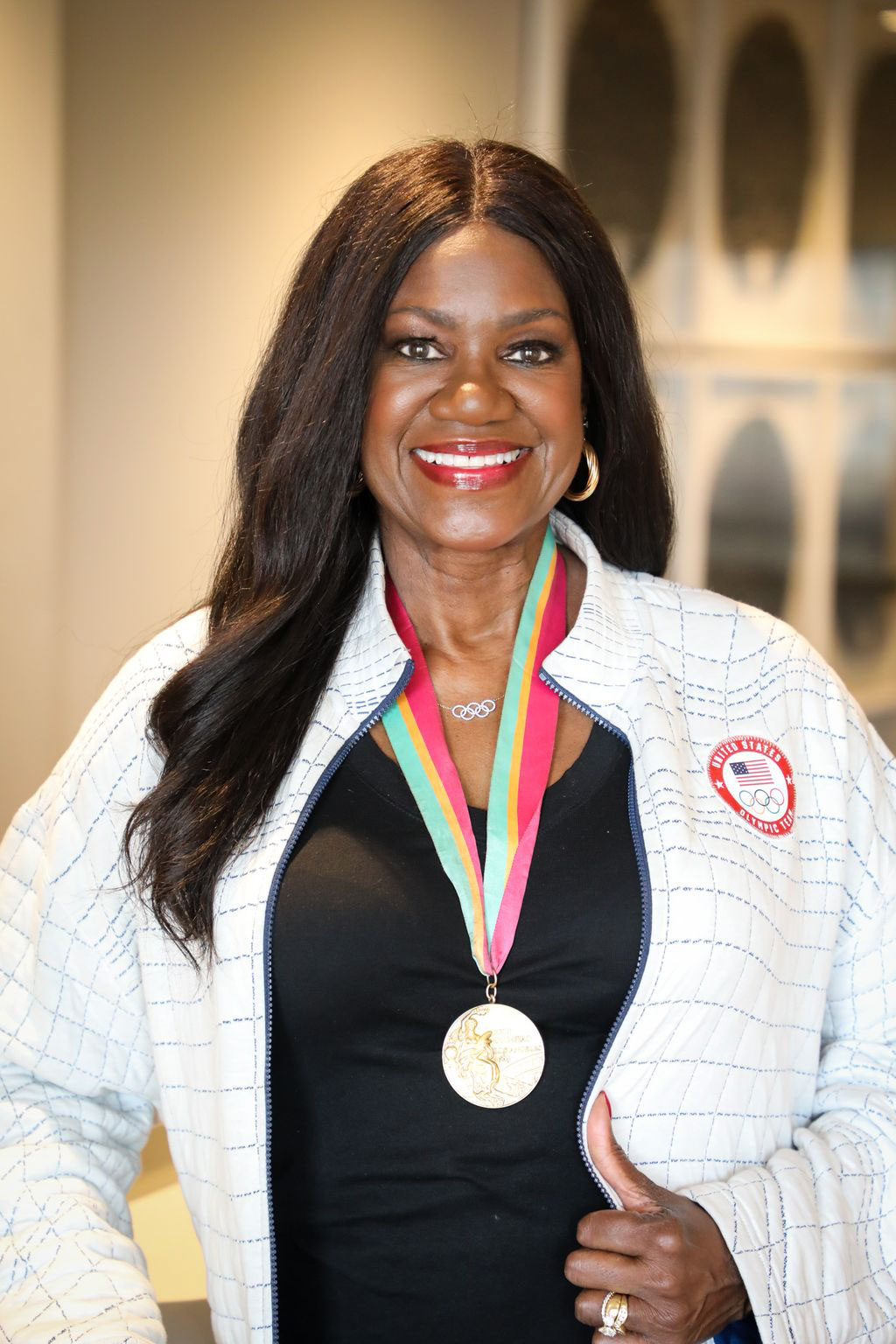
Run Your Own Race
For Fitzgerald Mosley, the last decade of her professional career has been similar to her Olympic performance where she kicked it into an even higher gear to beat the favorite, Great Britain’s Shirley Strong, and win the gold medal.
In 2016, she was named CEO of Laureus, a nonprofit organization that believes sport has the power to change the world. After stints as a senior advisor for Airbnb and president of the FundPlay Foundation, Fitzgerald Mosley was hired for her current position as CEO of Multiplying Good in July 2023. The mission of Multiplying Good is to help people reach their full potential and discover their power to deliver impact and bring about meaningful change.
“I really believe in– and care about–coming to work every day leading an organization that’s ultimately impacting people’s lives in a positive way,” she says. “That’s the utmost kind of thrill for me.”
Over time, Fitzgerald Mosley says all her experiences led to this moment of clarity where she realized she can help people and organizations win gold medals in life and business. That’s her daily focus, whether she’s leading Multiplying Good, serving on the Board of Directors for the Special Olympics, or speaking to a stellar group of graduates from Falk College.
“Where I can show up in the world is to truly help young people derive the benefits of sport participation in communities that otherwise wouldn’t have those opportunities, by funding those organizations, by helping them build their capacity so they could serve more young people, not just in the United States, but around the world,” Fitzgerald Mosley says.

Power Through Hurdles
Like one of Fitzgerald Mosley’s races, the line from Olympic gold medalist to influential executive may have been a relatively straight one, but not without its hurdles.
Fitzgerald Mosley’s bid for the 1988 Olympics was slowed by an ankle injury that required surgery in 1987. Still, she qualified for the Olympic trials and was leading in the finals before she tripped over the last hurdle and missed making the team by 1/100th of a second.
“The hardest team to make in the world is a U.S. team, particularly in swimming and track and field, where you pick yourself, no one picks you,” Fitzgerald Mosley says. “You have strep throat, you hit a hurdle, you fall in a race, you’re injured, sorry, you don’t get to go.”
Fitzgerald Mosley wasn’t able to capitalize financially on her Olympic success the way athletes can today, so she didn’t have a lot of money when she retired from running. But she did have her industrial engineering degree from Tennessee and found a job with a defense contractor, where she was working on projects such as conducting time and motion studies for the M1 Abrams tank or creating software design documents for the Seawolf submarine.
“Don’t get me wrong, these are all important things. And of course, I have the utmost admiration for the people who serve in our military,” Fitzgerald Mosley says. “But I just wasn’t the person to do that kind of work, and I think it was because it wasn’t aligned with my passion.”
After working as president and CEO of Women in Cable Telecommunications (now called The WICT Network), an organization dedicated to empowering women leaders, Fitzgerald Mosley started to hit her professional stride with jobs as Chief of Sport Performance for USA Track and Field and COO of the U.S. Olympic and Paralympic Committee.
“My career in both sport management and nonprofits was born at that point in time, when I realized I didn’t have to train three to six hours a day to participate in sport,” she says. “That was the big light-bulb moment for me to get that opportunity to work first for Special Olympics International and then with the Olympic and Paralympic Committee and have my heartstrings pulled by the mission of the organization.”
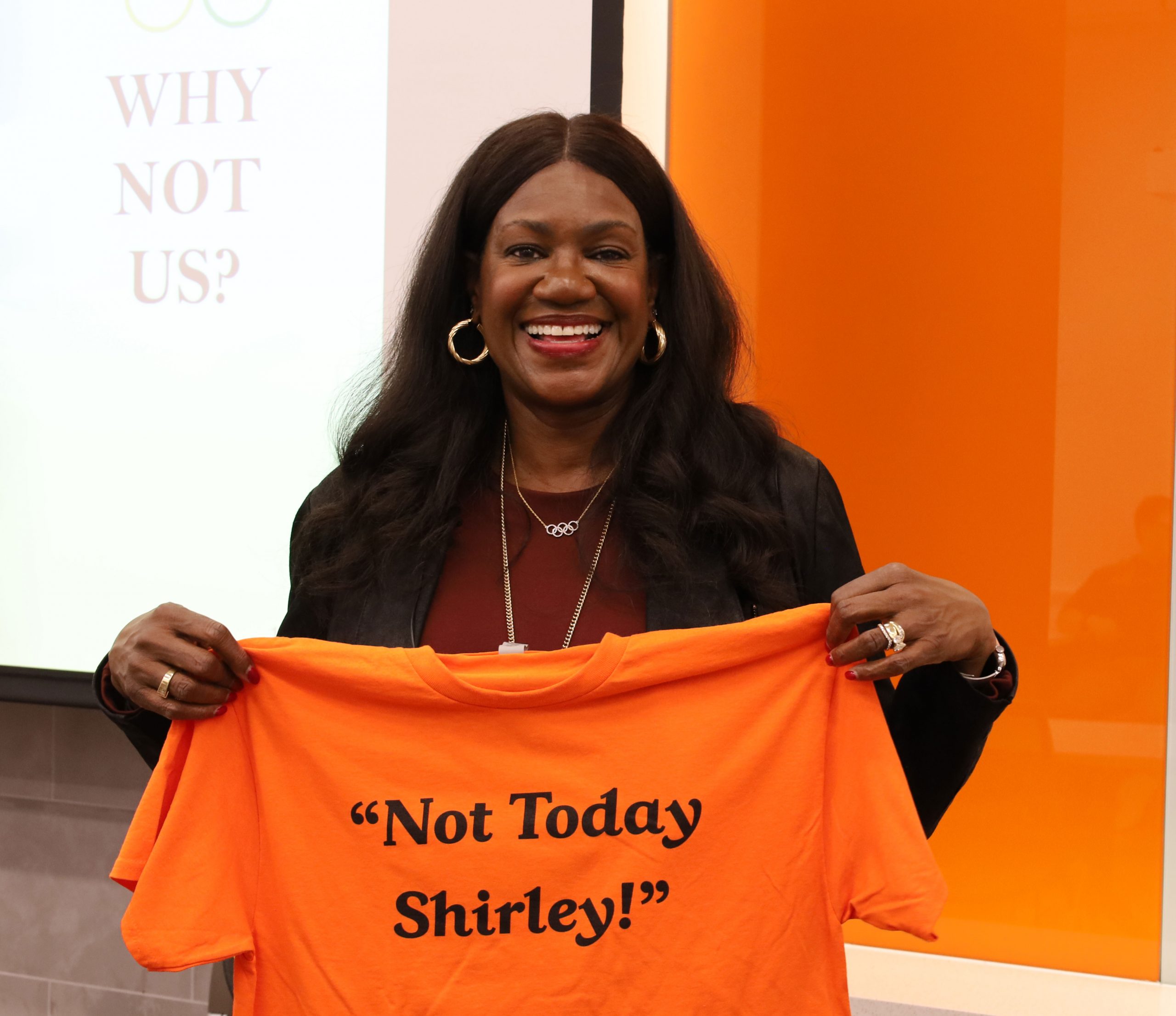
Have a ‘Strong’ Finish (a.k.a. Not Today Shirley)
Fitzgerald Mosley took full advantage of her second chance at the 1984 Olympic Games in Los Angeles, where she needed to beat Strong. At the 1983 World Championships, Strong had defeated Fitzgerald Mosley, a fitness fanatic who noticed that Strong was smoking cigarettes following their race.
“She’s smoking and she just beat me? She will never beat me again,” Fitzgerald Mosley told herself. “The next year (at the Olympics), I saw her smoking a cigarette between the semifinals and finals, and that reminded me of my vow.
“In the finals when we were racing, I saw her out of the corner of my eye, and I said to myself, ‘Not today Shirley,’’’ she says.
Fitzgerald Mosley ran the race in 12.84 seconds, beating Strong by 4/100th of a second to become the second U.S. woman and the first African-American woman to win a gold medal in the 100-meter hurdles. The 1984 track and field events were held in the Los Angeles Coliseum, where Babe Didrikson became the first U.S. woman to win what was then the 80-meter hurdles in 1932.
“It was magical,” Fitzgerald Mosley says. “To be on your home soil and walk into a stadium with 90,000 people screaming ‘U-S-A’ and cheering for you once you win, there’s nothing better.”
Fitzgerald Mosley has been inducted into several halls of fame, but she says perhaps her greatest honor occurred when she was selected as one of eight U.S Olympians to carry the Olympic flag into the stadium during the opening ceremony of the Centennial Olympic Games in Atlanta. Legendary boxer Muhammad Ali capped the ceremony by lighting the Olympic cauldron.
“We had practiced the night before under the cloak of darkness because no one knew who the eight of us were going to be that were walking in,” Fitzgerald Mosley says. “And we didn’t know Muhammed Ali was going to be the one who lit the torch.
“It had a mission impossible-type of feel to it, and that was pretty cool to be in on the inside of that little secret as well,” she adds.
Fitzgerald Mosley says she owes everything to her sport experiences, from winning the gold medal to her college education to meeting her husband, former Brown University football player Ron Mosley, with whom she has two grown children; a son, Isaiah, and a daughter, Maya, who runs track at the University of Maryland. She is most grateful to her parents, who encouraged her to get out there and keep trying until she found her passion.
“I would just say to young people in particular, don’t let your fear of failure get in your way of pursuing your dreams,” Fitzgerald Mosley says. “Because even if you fall somewhat short of the ultimate dream, you’re going to be so much further along toward that dream and that goal than you ever would have been if you didn’t start in the first place.”
Esteemed Scholarships
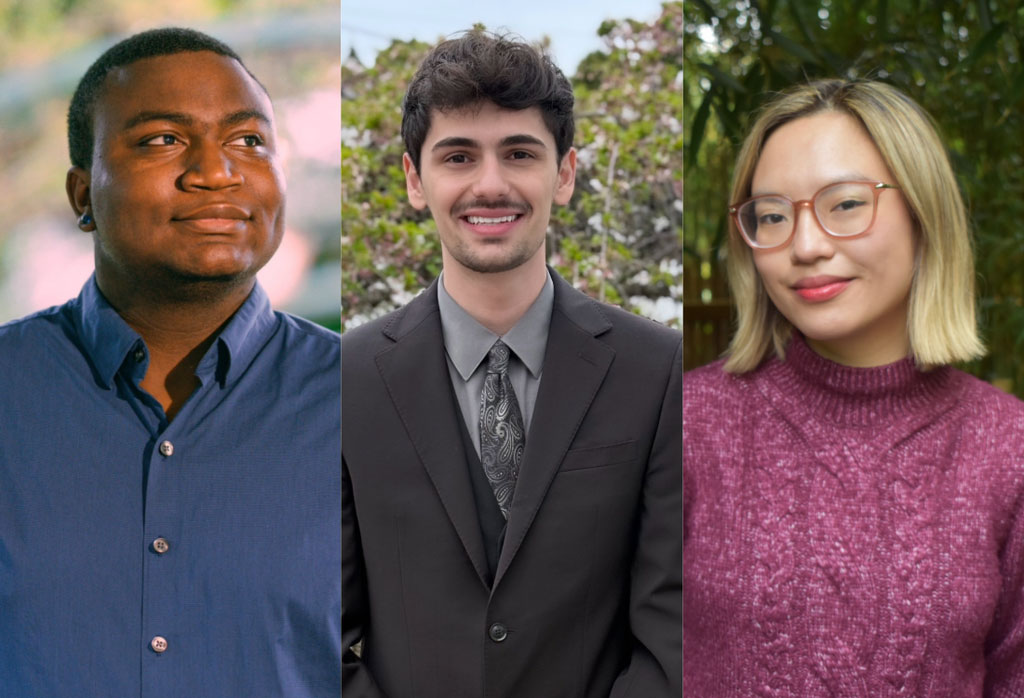
Thirty-five students have been chosen as the 2025-26 Syracuse University Remembrance Scholars.
The scholarships, now in their 36th year, were founded as a tribute to—and means of remembering—the students studying in London and Florence through Syracuse University who were killed in the Dec. 21, 1988, bombing of Pan Am Flight 103 over Lockerbie, Scotland. Those students were among the 270 people who perished in the bombing. The scholarships are funded through an endowment supported by gifts from alumni, friends, parents and corporations.
Significant support for the Remembrance Scholarships has been provided by Jean Thompson ’66 and Syracuse University Life Trustee Richard L. Thompson G’67 in memory of Jean Taylor Phelan Terry ’43 and John F. Phelan, Jean Thompson’s parents; by Board of Trustees Chairman Emeritus Steven Barnes ’82 and Deborah Barnes; by The Syracuse Association of Zeta Psi in memory of Alexander Lowenstein; and by the Fred L. Emerson Foundation.
Selection Process
Remembrance Scholars are chosen in their junior year through a competitive selection process. Applicants submitted an essay and a reflective response in multimedia, artistic, musical or written format as part of a comprehensive application. The application evaluation committee is composed of University faculty and staff and current Remembrance Scholars. The $5,000 scholarships are awarded on the basis of community impact, leadership, creativity and thoughtful academic inquiry.
“Remembrance Scholars, through their academic achievements, leadership and contributions to the campus and local communities, exemplify what a Syracuse University education has to offer and represent the promise of the students for whom these scholarships are named,” says Lois Agnew, vice chancellor, provost and chief academic officer. “We are proud to recognize their accomplishments.”
The Remembrance Scholars plan the Remembrance activities held at the University each year, and the cohort will be recognized during a convocation in the fall.
The 2025-26 Remembrance Scholars, their hometowns, majors and schools and colleges are the following:
- Ellie Allen of Newton, Massachusetts, a citizenship and civic engagement major in the Maxwell School of Citizenship and Public Affairs, a policy studies major in the Maxwell School and College of Arts and Sciences (A&S), and a member of the Renée Crown University Honors Program;
- Jacqueline Arbogast of Warwick, New York, a television, radio and film major in the S.I. Newhouse School of Public Communications;
- Rohan Bangalore of Sterling, Virginia, a policy studies major in the Maxwell School and A&S and a law, society and policy major in the Maxwell School;
- Caiyan Bass of Aurora, Colorado, a communication sciences and disorders major in A&S;
- Michael Capous of Wantagh, New York, a nutrition science major (pre-med track) in the David B. Falk College of Sport and Human Dynamics;
- Belinda Chan of Brooklyn, New York, a social work major in the Falk College;
- Tommy DaSilva of Newark, Delaware, a public health major in the Falk College; a policy studies major in the Maxwell School and A&S, and a citizenship and civic engagement major in the Maxwell School;
- Nick Dekaney of Syracuse, New York, a broadcast and digital journalism major in the Newhouse School;
- Ava Downey of Newport Beach, California, a linguistics major in A&S, an international relations major in the Maxwell School and A&S, and a member of the Renée Crown University Honors Program;
- Leah Farrell of New Milford, Connecticut, a citizenship and civic engagement major in the Maxwell School and policy studies major in the Maxwell School and A&S and a member of the Renée Crown University Honors Program;
- Abbey Fitzpatrick of Pacific Grove, California, a history and political science major in the Maxwell School and A&S;
- Olivia Fried of Clinton Corners, New York, an international relations major in the Maxwell School and A&S and magazine, news and digital journalism major in the Newhouse School;
- Tanishka Gajula of Chicago, Illinois, a biology major (pre-med track) in A&S;
- Olutoyin Green, of Long Island, New York, a health humanities and political philosophy major in A&S, a law, society and policy major in the Maxwell School, and a member of the Renée Crown University Honors Program;
- Alani Henderson of Syracuse, New York, a political science major in the Maxwell School and A&S and a law, society and policy major the Maxwell School;
- Nico Horning of El Dorado Hills, California, a broadcast and digital journalism major in the Newhouse School;
- Wafiq Khondkar of New Hyde Park, New York, a biotechnology and philosophy major in A&S and member of the Renée Crown University Honors Program;
- Edward Lu of Robbinsville, New Jersey, a music composition major in the College of Visual and Performing Arts (VPA);
- Joy Mao, of Cary, North Carolina, a policy studies major in the Maxwell School and A&S, a television, radio and film major in the Newhouse School, and a member of the Renée Crown University Honors Program;
- Martinez-Gutierrez of Laredo, Texas, a geography and sociology major in the Maxwell School and A&S; an environment, sustainability and policy major in the Maxwell School, and a member of the Renée Crown University Honors Program;
- German Nolivos of Miami, Florida, a political science major in the Maxwell School and A&S and a public relations major in the Newhouse School;
- Luiza Owour of Kisumu, Kenya, a biomedical engineering major in the College of Engineering and Computer Science (ECS);
- Marc Pantano of Newington, Connecticut, a marketing and supply chain management major in the Martin J. Whitman School of Management;
- Annaliese Pillitteri of Babylon, New York, a film major in VPA;
- Savion Pollard of Queens, New York, an electrical engineering major in ECS and a U.S. Navy veteran;
- Zachary Setzkorn of Overland Park, Kansas, a geography and history major in the Maxwell School and A&S, a social studies education major in the Maxwell School and School of Education, and member of the Renée Crown University Honors Program;
- Ethan Shavelson of Parkland, Florida, an acting major in VPA;
- Taylor Stubitsch of Arlington Heights, Illinois, a biochemistry and forensic science major in A&S and member of the Renée Crown University Honors Program;
- Candace Tabb of Rocky Hill, Connecticut, a civil engineering major in ECS;
- Nathan Torabi, of Visalia, California, a political science major in the Maxwell School and A&S; a citizenship and civic engagement and law, society and policy major in the Maxwell School, and a member of the Renée Crown University Honors Program;
- Jacquelyn Trotman of Edison, New Jersey, a retail management major in the Whitman School, an advertising major (creative track) in the Newhouse School, and a member of the Renée Crown University Honors Program;
- Anya Von Wolff of San Francisco, California, a fashion design major in VPA;
- Logan Wagner of Great Falls, Virginia, a political science major in the Maxwell School and A&S, an environmental sustainability and policy major in the Maxwell School and a history of music and cultures major in A&S;
- Gillian Weltman of Rochester, New York, a communications sciences and disorders and neuroscience major in A&S; and
- Ethan Yankey of Roseau, Dominica, a design studies major in VPA.
A Syracuse University News story by Kelly Homan Rodoski originally published on April 17, 2025. Here’s a video and story featuring Falk College’s 2024-25 Remembrance Scholars, Alyssa Sutherland and Tabitha Hulme.
The Hidden Ingredients

For many college students balancing classes, work, and workouts, protein bars and powders seem like an easy nutritional fix. They’re convenient, quick, and often marketed as the “healthy” choice–something you can grab on your way to the Barnes Center or toss in your bag between lectures. But when you take a closer look at the nutrition labels, the reality is much more complicated.
As a nutrition student and someone who has walked past the protein bar displays at almost every campus store, I’ve noticed how much we, as students, rely on these products and often without fully understanding what’s in them.
One of the biggest misconceptions I’ve noticed is that people primarily look at the sugar content when deciding if a protein bar is “healthy.” While monitoring added sugar is important, it’s not the only thing that matters. Many popular protein bars–even those labeled “low sugar”–contain surprisingly high amounts of saturated fats. Excess saturated fat intake has long been associated with increased cholesterol levels and a higher risk of cardiovascular disease. For students reaching for these bars thinking they’re doing something good for their bodies, that can be a hidden nutritional pitfall.
A quick walk through a convenience store will reveal bars that contain 4-6 grams of saturated fat–almost one third of the recommended daily limit in just one snack. It’s easy to see how this can add up, especially if you’re eating them regularly.
The Right Whey?

Similarly, protein powders have become a staple for many students, particularly those who frequent the Barnes Center gym. It’s common to see students adding a scoop of protein powder to their smoothies at Otto’s Juicebox, or shaking up a protein drink immediately after a workout.
However, it’s important to recognize that most protein powders, including whey, are highly processed products. Whey protein is a byproduct of cheese production and undergoes multiple industrial steps–filtration, drying, and the addition of flavorings, emulsifiers, and stabilizers–to create the powdered product you see on store shelves. These powders are categorized as “ultra-processed” foods, meaning they contain ingredients that have been significantly altered from their original form.
While whey protein is a complete protein source and rich in essential amino acids, it isn’t always the best option. Because it is derived from milk, students with lactose intolerance or milk allergies may experience digestive discomfort or adverse reactions. Even for those without sensitivities, the ultra-processed nature of these powders often means they are paired with added sugars, artificial sweeteners, and thickeners–ingredients that may not support long-term health when consumed in excess.
Beyond the nutritional profile, relying heavily on these processed supplements can distance students from whole food protein sources, which offer not only protein but also fiber, vitamins, and minerals that work synergistically to support health.
High Sodium, Low Fiber

Another sneaky culprit? Sodium. Some protein bars and shakes contain 200–300 mg of sodium per serving, which can quietly build up throughout the day, especially when combined with dining hall meals or packaged snacks.
High sodium intake is associated with elevated blood pressure and increased cardiovascular risk, especially in individuals sensitive to salt. While sodium isn’t inherently bad (our bodies need it!), many students don’t realize just how much they’re consuming from seemingly “healthy” snacks. When choosing bars or powders, aim for options that have less than 200 mg of sodium per serving, particularly if you’re consuming more than one a day.
Astonishingly, many protein bars are low in fiber, which is a key nutrient for digestive health and satiety. Choosing a bar with at least three grams of fiber can help keep you fuller for longer, regulate digestion, and even maintain stable blood sugar levels. Fiber is especially important if you’re eating a protein bar as a meal replacement or on-the-go snack between classes.
In a campus environment where schedules are packed and dining options can sometimes feel limited, it’s easy to default to prepackaged, processed products without much thought. But it’s important to remember that nutrition is obviously nuanced. Choosing a protein bar or powder isn’t just about how much protein it has, it’s about the whole nutritional profile and how it fits into your overall dietary needs.
As nutrition students at Falk College, we are encouraged to think critically about the foods we consume and the information we’re given. That same mindset is something all students can benefit from when reaching for a quick source of protein. Taking an extra moment to read a label can help you make better choices–choices that support not just your workouts, but your long-term health.
Sudiksha Khemka ’28 is a nutrition major in the Department of Nutrition Science and Dietetics in the Falk College of Sport and Human Dynamics. She will be a regular contributor to the Falk College website, and she also writes a regular column in the Daily Orange.
‘The Language of Passion’
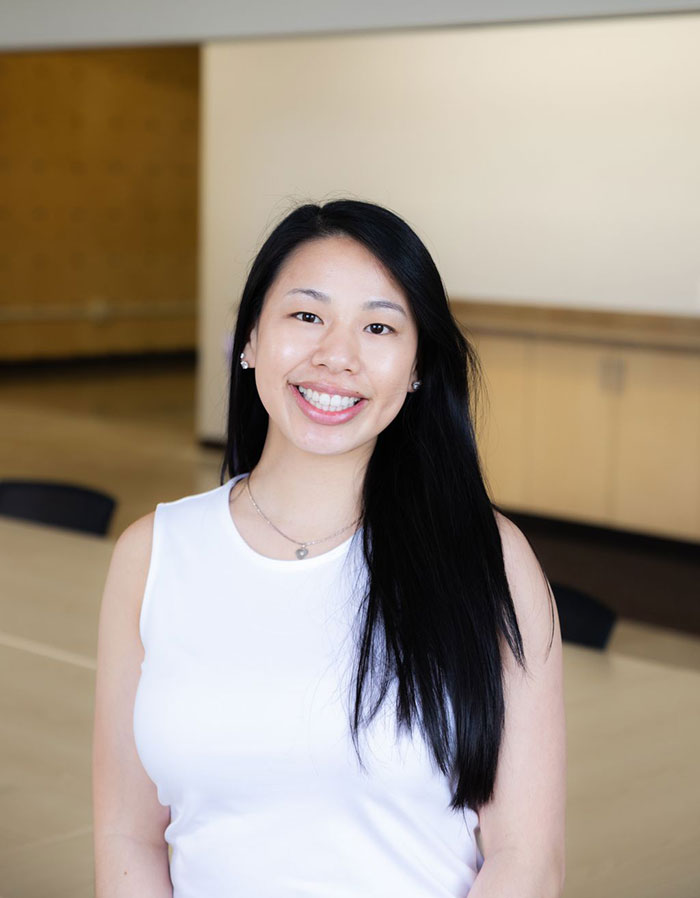
For nutrition science graduate student Isabelle Haeberly, a seven-week rotation at a long-term care facility provided her with insight that will last a lifetime.
Haeberly worked at the facility in the Syracuse area as part of her “supervised experiential learning” (SEL) requirement needed to receive her master’s degree. Haeberly emerged from her long-term care experience recognizing that the lessons she learned there will translate to any work environment she chooses.
“This rotation emphasized learning agility–the ability to take knowledge from one setting and apply it to another,” Haeberly says. “While long-term care may not be my ideal work environment, the critical thinking, attention to detail, individualization of interventions, and interdisciplinary collaboration I developed will translate into any area of dietetics.”
In SEL settings, students work under the supervision of a preceptor, who is generally a registered dietitian. In a reflection that Haeberly wrote following her long-term care facility SEL, it was clear how deeply Haeberly was impacted by her preceptor and other healthcare professionals at the facility.
“The language of passion is universal regardless of profession with the commonality of wanting to get better at your craft,” Haeberly wrote.
We asked Haeberly, who received her bachelor’s degree in exercise science from Falk College in 2023, to share her reflection with us and here’s what she wrote about her experience this winter:
“During my seven-week rotation at the long-term care facility, I gained valuable insight into the complexities of geriatric nutrition. This experience greatly deepened my appreciation for life in a way I don’t think any other experience could have. It brought to light the fact that health can decline rapidly. In this setting in particular, it highlighted how social isolation plays a major role in the health of residents and how family support makes a huge difference. I also observed firsthand how chronic pain contributes to behavioral changes, often mistaken for personality traits such as the stereotypical ‘old people are cranky.’ Overall, this rotation added a new perspective to how I view the world, and it made me realize just how short life is.
“Working with my preceptor, I strengthened my nutrition assessment skills and competence in reading medical records, and learned to apply my medical nutrition therapy coursework in a clinical setting. I also witnessed how dietitians function as detectives, collaborating with speech-language pathologists, nurses, and social workers to piece together accurate information and develop appropriate individualized interventions.
“One exceptional nurse manager’s attention to detail and passion for her profession set a high standard for patient care–one which everyone should strive for regardless of which healthcare profession they are in. This was one of my main takeaways. The qualities this nurse manager demonstrated showed me how much you can learn from professions other than your own.
“This experience provided me with valuable skills that will benefit me in my future as a dietitian, regardless of the setting I choose. It helped me gain confidence in my ability to learn quickly through hands-on experience and in my ability to adapt and even excel when thrown into a situation or position. It also greatly improved my confidence in my skills writing nutrition assessments and I got to see how my attention to detail helped me do well with the responsibilities in this type of dietetic role. This is a skill that will serve me in any area of dietetics.”
Isabelle Haeberly earned her bachelor’s degree in exercise science from Falk College in 2023. This academic year, Haeberly, Greta Smith, and Cassidy Mosher were recipients of the Ann Selkowitz Litt Memorial Scholarship from the Academy of Nutrition and Dietetics Foundation. The annual Ann Selkowitz Litt Distinguished Speaker Series was held April 1 in Falk College.

The Path to RD/RDN
As of January 2024, dietitians are required to hold a master’s degree, so the Department of Nutrition and Science and Dietetics in Falk College modified its program into a two-year graduate level program in which students complete the requirements for their degree in nutrition science and all of the SEL requirements in a comprehensive program.
The program’s accreditation standards require that students gain experience with patients/clients who require certain medical nutrition therapy, range across the lifespan, and are from diverse backgrounds. The program provides students with four rotations in different settings: acute care, long-term care, community education and counseling, and food service management.
Nicole Beckwith, director of the Master of Arts in Nutrition Science program, served as a preceptor for the program for 13 years and says the support the program receives from preceptors–many of whom are Syracuse University and Falk College alumni–is integral to its success. April is National Preceptor Month, and in Falk’s program Beckwith says preceptors provide 8,000 hours of mentorship during an academic year for a fully enrolled class of 12 students.
“The importance of preceptors who are willing to welcome students into their workspace to provide mentorship is critical to our profession,” Beckwith says. “We seek to build strong relationships with our preceptors and support them through training opportunities, frequent communication, and appreciation gestures. Without preceptors, we have no programs and no profession.”
Once master’s students meet their SEL requirements, they are eligible to take the credentialing exam to become a registered dietitian/registered dietitian nutritionist (RD/RDN). They must pass the exam to become an RD/RDN, which can be used interchangeably. Visit the Nutrition Science and Dietetics website to learn more about academic programs and career opportunities.
‘The Athlete’s Gut’
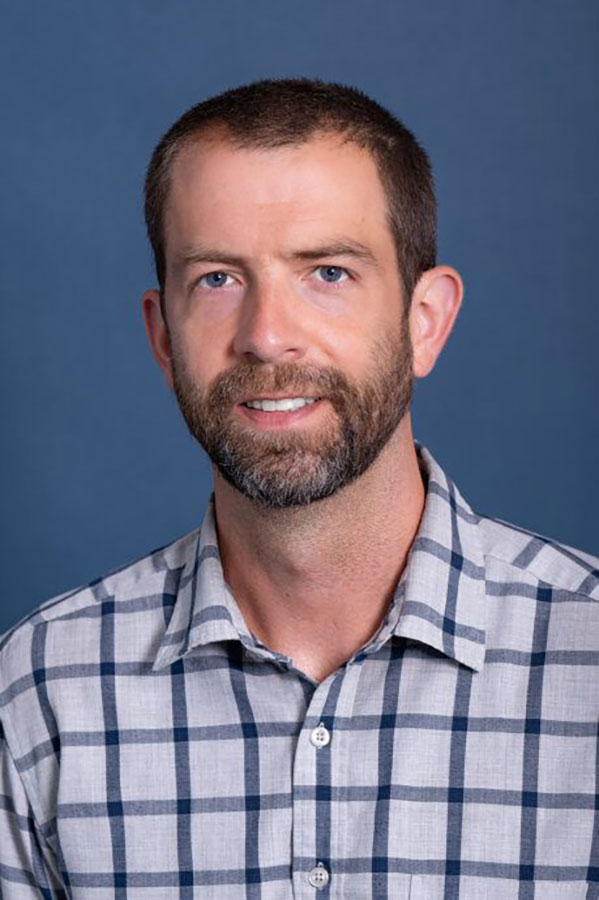
Patrick Wilson, Ph.D., RDN, as the featured speaker of the Ninth Annual Ann Selkowitz Litt Distinguished Speaker Series. His lecture, “The Athlete’s Gut: A Scientist’s Perspective on Translating Research into Practice to Manage Gastrointestinal Issue in Athletes,’’ will be held at 5:30 p.m. Tuesday, April 1, in 200 White Hall, Falk College. The event is free and open to the public.
Wilson is an associate professor of exercise science at Old Dominion University, where he directs the Human Performance Laboratory and conducts research. Wilson has published 80 peer-reviewed scientific articles related to nutrition, exercise performance, and health.
In 2020, Wilson published “The Athlete’s Gut: The Inside Science of Digestion, Nutrition, and Stomach Distress,” a book that garnered national and international attention. The Athlete’s Gut offers athletes and practitioners a window into gut functioning and provides tips to help them prevent and manage gastrointestinal problems, ultimately allowing athletes to feel and perform at their best.
“We are excited to have Dr. Wilson share his expertise in gut health and athlete performance, which is a novel topic for the Ann Selkowitz Litt Distinguished Speaker Series,” says Lynn Brann, chair of the Department of Nutrition and Food Studies in Falk College. “His background in both nutrition and exercise science highlights the important connections between these two disciplines.”
Wilson’s work has focused on the causes of gut troubles in athletes, as well as interventions aimed at alleviating such problems. In addition, his research has explored the utility of common hydration biomarkers used in sport and the impact that various factors can have on their validity.
A national thought leader in sport nutrition, Wilson has served as a featured interviewee for numerous news outlets, including The New York Times, The Washington Post, Runner’s World, and The Globe and Mail (Canada).
Outside of his work, Wilson is a committed distance runner. He enjoys the process of applying what he’s learned over the years to optimize his own performance.
Wilson earned a Ph.D. in Kinesiology from the University of Minnesota in 2014, where he also took substantial coursework and received training in the areas of public health and epidemiology. Prior to earning his doctorate, he spent a year at the Mayo Clinic gaining expertise in the realms of clinical and community nutrition. He has a Bachelor’s degree in dietetics and is credentialed as a Registered Dietitian Nutritionist.
Register to attend Wilson’s lecture in person or virtually. For more information about the Ann Litt Lecture, accommodations and parking requests, please contact Amy Edmond-Drapas at aledmond@syr.edu or 315.443.8989.
About the Ann Selkowitz Litt Distinguished Speaker Series
Ann Selkowitz Litt ’75 (1953-2007) was a nationally known nutritionist who helped children and adolescents with eating disorders and assisted developing athletes in reaching their full potential. The nutrition consultant to CosmoGirl magazine, Litt was the author of “The College Students’ Guide to Eating Well on Campus,” “Fuel for Young Athletes,” and the “American Dietetic Association Guide to Private Practice.” She was the nutritionist for the NFL’s Washington Commanders and served as spokesperson for several media campaigns during her career, including the “Got Milk” campaign. After her death, the Ann S. Litt Foundation, Inc., was created to support nutrition education. Through a generous gift from this foundation to Falk College, the Ann Selkowitz Litt Distinguished Speaker Series was created at Syracuse University in 2015.
Page 1 of 21
